韩语初中教育53期
朝鲜语本科课程大纲(最终)

中国海洋大学外国语学院2016版本科生课程大纲朝鲜语系2016年9月实施七、学术诚信学习成果不能造假,如考试作弊、盗取他人学习成果、一份报告用于不同的课程等,均属造假行为。
他人的想法、说法和意见如不注明出处按盗用论处。
本课程如有发现上述不良行为,将按学校有关规定取消本课程的学习成绩。
八、大纲审核教学院长:院学术委员会签章:中国海洋大学本科生课程大纲一、课程介绍1.课程描述:《高级韩国语Ⅰ》作为朝鲜语专业基础教育层面的一门必修课程,围绕听、说、读、写、译五个方面的专业基本技能要求开展教学活动,目的在于使学生熟练掌握朝鲜语(韩语)的基本知识,了解韩国人的思维方式以及韩国传统文化。
2.设计思路:本课程引导高年级朝鲜语专业学生通过课文学习,介绍韩语词汇、语法、句型等基础语言知识,了解韩语语言结构及韩国传统文化,从而在实践中准确、恰当地使用韩语。
课程内容包括四个部分:词汇、语法、句型和文化解说。
3.课程与其他课程的关系:先修课程:中级韩国语Ⅱ4.课程对毕业生能力达成的贡献:本课程能够锻炼学生韩语听、说、读、写、译五个方面的专业基本素质,使学生了解韩国风土人情与社会文化,培养学生举一反三的能力,提高韩国语水平。
二、课程目标高级韩国语Ⅰ作为朝鲜语专业高年级学生的一门学科基础教育层面必修课程,其教学目的在于提升学生的韩国语综合水平。
到课程结束时,学生应能:1.熟练掌握韩国语的语音规则和语音变化;2.熟记韩国语高频词汇、高级语法以及惯用句、成语等;3.全面掌握听、说、读、写、译五个方面的语言技能。
三、学习要求1.按时上课,上课认真听讲,积极参与课堂讨论、小组活动。
本课程将包含较多的随堂练习、讨论等课堂活动,课堂表现和出勤率是成绩考核的组成部分。
2.按时完成常规练习作业。
这些作业要求学生按书面形式提交,只有按时提交作业,才能掌握课程所要求的内容。
延期提交作业需要提前得到任课教师的许可。
3.完成教师布置的一定量的阅读文献和背景资料等作业,其中大部分内容要求以小组合作形式完成。
首尔大学韩国语1自学一本通

图书目录
预备篇 第1单元(第1-3课) 第2单元(第4-6课) 第3单元(第7-9课) 第4单元(第10-12课) 第5单元(第13-15课) 第6单元(第16-18课) 第7单元(第19-21课) 第8单元(第22-24课) 第9单元(第25-27课) 第10单元(第28-30课)
推荐
由韩国首尔大学语言教育院编写的《首尔大学韩国语》系列教材由外研社引进出版后,深受广大韩国语自学 者的好评,并被国内诸多韩国语培训机构广泛采用。为此我们特意编写了《首尔大学韩国语》的同步练习册《首 尔大学韩国语自学一本通》系列图书,旨在为韩语自学者提供更加全面、系统的自学辅导用书。
作者简介
马会霞,中国人民解放军外国语学院亚非语系韩国语专业教师,正在攻读朝鲜语专业博士学位。著有普通高 等教育十一五国家级规划教材韩国语国情阅读教程《韩国的社会》,与其他编者共同编写了《外研社·韩汉双解 基础韩国语学习词典》,发表了《句式变量和汉韩翻译中的拆译类句式》等论文。
谢谢观看
首尔大学韩国语1自学一本通
图书
01 内容简介
03 推荐
目录
02 图书目录 04ቤተ መጻሕፍቲ ባይዱ作者简介
《首尔大学韩国语1自学一本通》是2015年外语教学与研究出版社出版的图书,作者是马会霞、边铀铀、董 雅琳。
内容简介
人气韩语教材《首尔大学韩国语1》的配套辅导用书,详细讲解重点词汇、语法,并结合大量练习题巩固所学 知识,为韩语自学者提供更加全面、系统的自学辅导用书。
林玲基础韩国语1-15讲(全)
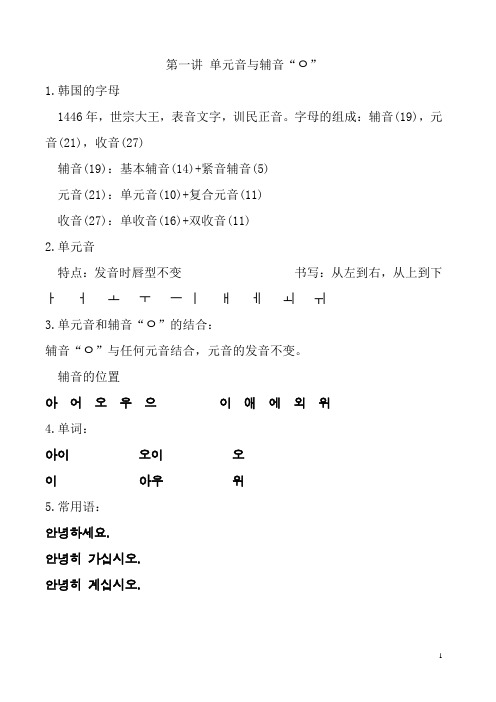
第一讲单元音与辅音“ㅇ”1.韩国的字母1446年,世宗大王,表音文字,训民正音。
字母的组成:辅音(19),元音(21),收音(27)辅音(19):基本辅音(14)+紧音辅音(5)元音(21):单元音(10)+复合元音(11)收音(27):单收音(16)+双收音(11)2.单元音特点:发音时唇型不变书写:从左到右,从上到下ㅏㅓㅗㅜㅡㅣㅐㅔㅚㅟ3.单元音和辅音“ㅇ”的结合:辅音“ㅇ”与任何元音结合,元音的发音不变。
辅音的位置아어오우으이애에외위4.单词:아이오이오이아우위5.常用语:안녕하세요.안녕히가십시오.안녕히계십시오.第二讲基本辅音辅音:基本辅音(14)+紧音辅音(5)ㄱㄴㄷㄹㅁㅂㅅㅇㅈㅎㄱ:가거고구그기개게괴귀ㄴ:나너노누느니내네뇌뉘ㄷ:다더도두드디대데되뒤ㄹ:라러로루르리래레뢰뤼ㅁ:마머모무므미매메뫼뮈ㅂ:바버보부브비배베뵈뷔ㅅ:사서소수스시새세쇠쉬ㅈ:자저조주즈지재제죄쥐ㅎ:하허호후흐히해헤회휘가거고구그기개게괴귀나너노누느니내네뇌뉘다더도두드디대데되뒤라러로루르리래레뢰뤼마머모무므미매메뫼뮈바버보부브비배베뵈뷔사서소수스시새세쇠쉬아어오우으이애에외위자저조주즈지재제죄쥐하허호후흐히해헤회휘1、单词:가구고기가수나노래도시우리머리모자바다무무아버지주소자리어머니하나허리2、常用语:고맙습니다 / 감사합니다아닙니다 / 천만에요第三讲复合元音ㅣ + 单元音:ㅏㅓㅗㅜㅐㅔㅣ + ㅏ = ㅑㅣ + ㅓ = ㅕㅣ + ㅗ = ㅛㅣ + ㅜ = ㅠㅣ + ㅐ = ㅒㅣ + ㅔ = ㅖ单元音 + 单元音ㅗ + ㅏ = ㅘㅗ + ㅐ = ㅙㅜ + ㅓ = ㅝㅜ + ㅔ = ㅞㅡ + ㅣ = ㅢ1、单词:가게유리과자시계고구마휴지쇠고기우유돼지여자세수의사2、常用语:미안합니다 / 죄송합니다괜찮습니다第四讲辅音(送气音+紧音)基本辅音:ㄱㄷㅂㅈ送气音:ㅋㅌㅍㅊ基本辅音:ㄱㄷㅂㅅㅈ紧音:ㄲㄸㅃㅆㅉ1、单词:코포도커피파찌개싸다차가짜쓰다키보다끄다2、常用语:수고하셨니다.실례합니다.第五讲单收音发音:ㄱ:악먹곡식학ㄷ:닫묻낟삳잗ㅂ:밥업줍팝갑(鼻音) ㅇ:양정상방창ㄴ:언천먼변관ㅁ:엄심잠험밤ㄹ:솔 잘 홀 풀 열1、单词:국 앞 봄 밥 옆 눈 옷 꽃 죽2、常用语: 어서오세요. 많이드세요. 잘먹겠습니다.第六讲 双收音辅音的顺序:ㄱ ㄴ ㄷ ㄹ ㅁ ㅂ ㅅㅇ ㅈ ㅊ ㅋ ㅌ ㅍ ㅎ元音的顺序:ㅏ ㅑ ㅓ ㅕ ㅗ ㅛ ㅜ ㅠ ㅡ ㅣ 双收音的读音*双收音的读音,发顺序在前的收音发音。
53中考英语听力突破2024版听力材料
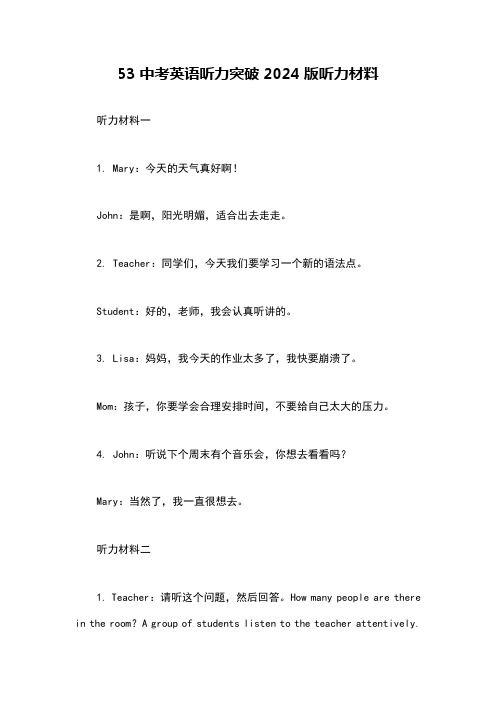
53中考英语听力突破2024版听力材料听力材料一1. Mary:今天的天气真好啊!John:是啊,阳光明媚,适合出去走走。
2. Teacher:同学们,今天我们要学习一个新的语法点。
Student:好的,老师,我会认真听讲的。
3. Lisa:妈妈,我今天的作业太多了,我快要崩溃了。
Mom:孩子,你要学会合理安排时间,不要给自己太大的压力。
4. John:听说下个周末有个音乐会,你想去看看吗?Mary:当然了,我一直很想去。
听力材料二1. Teacher:请听这个问题,然后回答。
How many people are there in the room?A group of students listen to the teacher attentively.Student 1:房间里大约有5个人。
Student 2:不,我数了一下,有7个人。
Teacher:好的,请再听一次,这次我要强调一下问题的细节。
How many people are there in the room?Now listen carefully and try to answer.Student 1:哦,我明白了,老师。
房间里大约有6个人。
Student 2:这次我回答对了。
2. John:昨天我听说了一家新开的餐厅,据说那里的披萨很好吃。
Mary:真的吗?我也要去尝尝看!3. Teacher:请同学们注意听这段听力材料,并记录下其中的重要信息。
Some students like to eat a big meal in the morning, while others prefer to eat light. Now listen carefully and try to understand the differences between these two groups of students.Student 1:我觉得早上吃大餐很好啊,可以精力充沛地开始一天的学习和工作。
53英语七年级上册答案
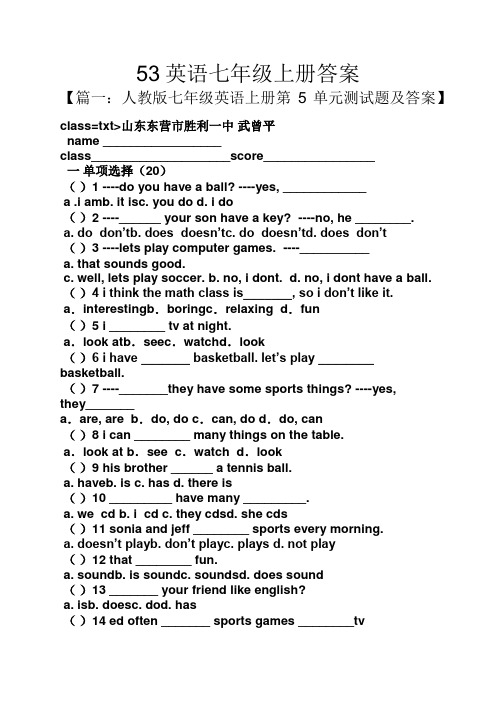
53英语七年级上册答案【篇一:人教版七年级英语上册第5单元测试题及答案】class=txt>山东东营市胜利一中武曾平name _________________class____________________score________________一单项选择(20)()1 ----do you have a ball? ----yes, ____________a .i amb. it isc. you do d. i do()2 ----______ your son have a key? ----no, he ________.a. do don’tb. does doesn’tc. do doesn’td. does don’t()3 ----lets play computer games. ----__________a. that sounds good.c. well, lets play soccer. b. no, i dont.d. no, i dont have a ball.()4 i think the math class is_______, so i don’t like it.a.interestingb.boringc.relaxing d.fun()5 i ________ tv at night.a.look atb.seec.watchd.look()6 i have _______ basketball. let’s play ________ basketball.()7 ----_______they have some sports things? ----yes,they_______a.are, are b.do, do c.can, do d.do, can()8 i can ________ many things on the table.a.look at b.see c.watch d.look()9 his brother ______ a tennis ball.a. haveb. isc. hasd. there is()10 _________ have many _________.a. we cdb. i cdc. they cdsd. she cds()11 sonia and jeff ________ sports every morning.a. doesn’t playb. don’t playc. playsd. not play()12 that ________ fun.a. soundb. is soundc. soundsd. does sound()13 _______ your friend like english?a. isb. doesc. dod. has()14 ed often _______ sports games ________tva. watch, onb watch, inc. watches, ind. watches, on()15. peter gives(给) ______ some pencils and we like_______.a. we, itb. us, themc. us, theyd. me, they()16 ----what a beautiful skirt! ---- ______________a. all rightb. you’re right.c. don’t say so.d. thank you()17 she is a ______ singer. she sings ________.a. good, goodb. good, wellc. well, goodd. well, well()18 he _______ a brother and a sister.a. doesn’t haveb. doesn’t hasc. don’t hasd. don’t have()19 there _______ a soccer ball and eight __________.a. are, basketballsb. are, basketballc. is, basketballsd. is, basketball()20 we play sports __________.a. everydayb. each dayc. the every dayd. every day二阅读理解(5 )i have a friend. his name is john. he likes sports very much. he loves soccer, basketball, volleyball and baseball. he plays basketball very well. he likes watching games on tv. he plays sports every day. he often says(说), “let’s play …”. he joins(加入) two clubs: a basketball club and a baseball club. he has a sports collection. he has twelve tennis rackets, nine baseballs, three volleyballs, four basketballs and one soccer ball. ()21. my friend likes ________a soccerb basketballc baseballd . a, b and c()22. how does he play basketball?a okb very wellc good d right()23. does he play sports every day?a yes, he doesb no, he doesn’tc yes, he doesn’td no, he does.()24. is he a member(成员) of a baseball club?a yes, he isn’tb no, he isc yes, he isd no, he isn’t()25. how many sports tools(工具) does he have?a 10b 18c 23d 29三从下列方框中选出恰当的句子,完成对话。
标准韩国语第一册(初级) 单词表
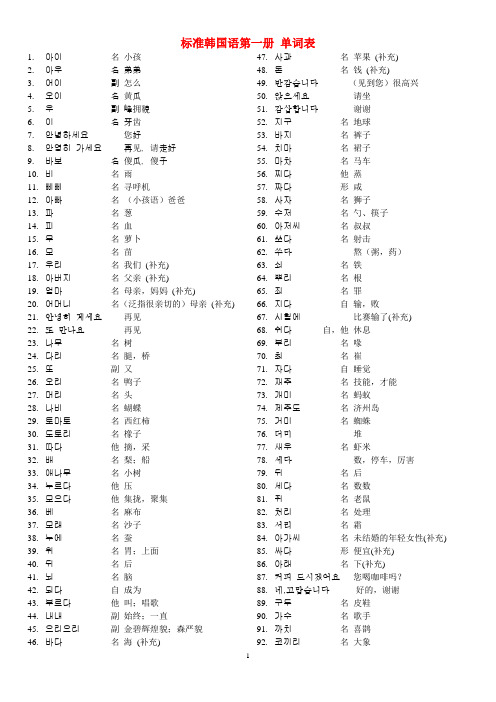
1.아이名小孩2.아우名弟弟3.어이副怎么4.오이名黄瓜5.우副峰拥貌6.이名牙齿7.안녕하세요您好8.안영히가세요再见,请走好9.바보名傻瓜,傻子10.비名雨11.삐삐名寻呼机12.아빠名(小孩语)爸爸13.파名葱14.피名血15.무名萝卜16.모名苗17.우리名我们(补充)18.아버지名父亲(补充)19.엄마名母亲,妈妈(补充)20.어머니名(泛指很亲切的)母亲(补充)21.안녕히계세요再见22.또만나요再见23.나무名树24.다리名腿,桥25.또副又26.오리名鸭子27.머리名头28.나비名蝴蝶29.토마토名西红柿30.도토리名橡子31.따다他摘,采32.배名梨;船33.애나무名小树34.누르다他压35.모으다他集拢,聚集36.베名麻布37.모래名沙子38.누에名蚕39.위名胃;上面40.뒤名后41.뇌名脑42.되다自成为43.부르다他叫;唱歌44.내내副始终;一直45.으리으리副金碧辉煌貌;森严貌46.바다名海(补充) 47.사과名苹果(补充)48.돈名钱(补充)49.반감습니다(见到您)很高兴50.앉으세요请坐51.감삽합니다谢谢52.지구名地球53.바지名裤子54.치마名裙子55.마차名马车56.찌다他蒸57.짜다形咸58.사자名狮子59.수저名勺、筷子60.아저씨名叔叔61.쏘다名射击62.쑤다熬(粥,药)63.쇠名铁64.뿌리名根65.죄名罪66.지다自输,败67.시험에比赛输了(补充)68.쉬다自,他休息69.부리名喙70.최名崔71.자다自睡觉72.재주名技能,才能73.개미名蚂蚁74.제주도名济州岛75.거미名蜘蛛76.더미堆77.새우名虾米78.세다数,停车,厉害79.뒤名后80.세다名数数81.쥐名老鼠82.처리名处理83.서리名霜84.아가씨名未结婚的年轻女性(补充)85.싸다形便宜(补充)86.아래名下(补充)87.커피드시겠어요您喝咖啡吗?88.네,고맙습니다好的,谢谢89.구두名皮鞋90.가수名歌手91.까치名喜鹊92.코끼리名大象93.코名鼻子94.카메라名相机95.호수名湖,湖水96.휴지名废纸97.까마귀名乌鸦(补充)98.귀名耳朵(补充)99.아가名孩子100.애기名小孩子101.토기名兔子102.도기名斧子103.가게名店铺104.거기那里105.여기这里106.모기名蚊子107.무지개名彩虹108.지우개名橡皮擦109.너무비싸요太贵了(补充) 110.어디가세요去哪?(补充) 111.시내에가요去市中心(补充) 112.신문주세요请给我报纸113.어느신문요什么报纸?114.중국신문요中国报纸115.야구名棒球116.야자名椰子117.여자名女子118.소녀名少女119.요리名菜,料理120.유리名玻璃121.차표名车票122.뉴스名新闻123.얘感喂124.걔代那孩子125.예名从前126.시계名钟表127.손목시계名手表128.모래시계名沙漏129.주야名昼夜130.시야名视野131.휴지名废纸;餐巾纸132.벼名水稻133.쟤名那个134.묘비名石碑135.차례名顺序;祭祀136.요리名料理137.세계名世界138.차례顺序,目录139.여기가어디예요这是什么地方?140.명동이에요是明洞141.중국대사관이멀어요这儿离中国大使馆远吗?142.안멀어요.가까워요不远,很近。
《课程教育研究》新教师教学
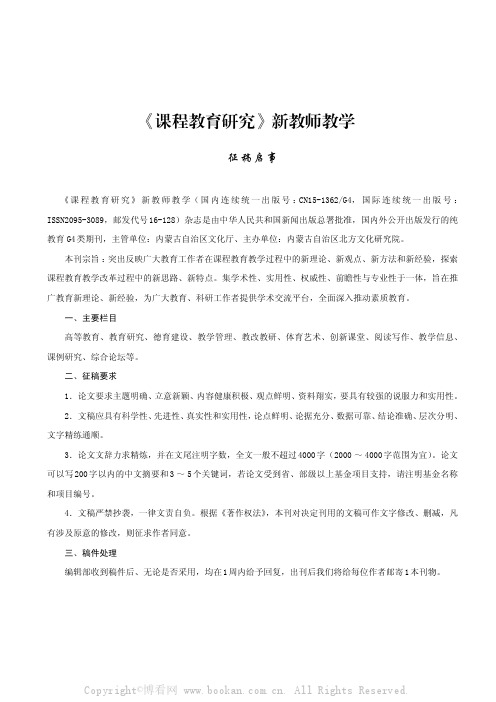
教育G4类期刊,《课程教育研究》新教师教学征稿启事《课程教育研究》新教师教学(国内连续统一出版号:CN15-1362/G4,国际连续统一出版号:ISSN2095-3089,邮发代号16-128)杂志是由中华人民共和国新闻出版总署批准,国内外公开出版发行的纯本刊宗旨:突出反映广大教育工作者在课程教育教学过程中的新理论、新观点、新方法和新经验,探索课程教育教学改革过程中的新思路、新特点。
集学术性、实用性、权威性、前瞻性与专业性于一体,旨在推广教育新理论、新经验,为广大教育、科研工作者提供学术交流平台,全面深入推动素质教育。
一、主要栏目高等教育、教育研究、德育建设、教学管理、教改教研、体育艺术、创新课堂、阅读写作、教学信息、课例研究、综合论坛等。
二、征稿要求1.论文要求主题明确、立意新颖、内容健康积极、观点鲜明、资料翔实,要具有较强的说服力和实用性。
2.文稿应具有科学性、先进性、真实性和实用性,论点鲜明、论据充分、数据可靠、结论准确、层次分明、文字精练通顺。
3.论文文辞力求精炼,并在文尾注明字数,全文一般不超过4000字(2000~4000字范围为宜)。
论文可以写200字以内的中文摘要和3~5个关键词,若论文受到省、部级以上基金项目支持,请注明基金名称和项目编号。
4.文稿严禁抄袭,一律文责自负。
根据《著作权法》,本刊对决定刊用的文稿可作文字修改、删减,凡有涉及原意的修改,则征求作者同意。
三、稿件处理编辑部收到稿件后、无论是否采用,均在1周内给予回复,出刊后我们将给每位作者邮寄1本刊物。
主管单位:内蒙古自治区文化厅、主办单位:内蒙古自治区北方文化研究院。
目 录高等教育信管专业创新实践教学平台的构建.......................................................毕雪华 姬金虎 严传波 吴顺华(1)移动端虚拟空间实时在线学习系统在教改中的应用.................................................邵一川 张倚宁 胡浩德(2)民办高校大学英语教学现状的调查研究...............柯 可(3)《医用电子技术》口试考核法及教学效果探讨.............................................段颖妮 谢 茹 樊孝喜 马远新(4)基于民族文化和人文素养提升的大学英语教学方法研究.............................................................艾清华(5)农学类本科《试验设计与统计分析》教学改革与实践...陈进卿(6)信息与计算科学专业建设的几点思考.........高瑞梅 孟品超(7)药学大学生校外实践教育基地的建设与实践——以沈阳药科大学药学院为例.................康 正 王 斌 高 倩 穆海日(8)浅谈英语专业学生如何学好二外法语.................黄 倩(9)浅析大学生公益创业素质特征模型构建..............樊婧昊(10)新课改背景下以“能力为本位”的工程类课程教学模式的构建..............................................宁喜亮 李媛媛(11)高校心理学教学方法研究..........................刘艳艳(12)全媒体语境新闻与传播专业硕士人才培养模式探析........................................................李丹昱 王晓晨(14)本科生国际联合培养的实践与探索..马来好 乔卫亮 陈海泉(15)文化视角下的军队院校课程建设初探........方 莉 谭晓靖(16)谈高职物流管理专业核心能力的培养................刘 篪(18)从广谱哲学视角分析中国的腐败问题................商明利(19)浅析新形势下高校学生干部队伍建设——以武汉地区高校为例......................................钱云瀚 张馨悦 罗晓芳(20)双语教学在环境水力学中的探讨....................金 磊(21)经济数学教学改革的探索与实践............刘 伟 张继超(22)冶金炉案例教学课程建设中重点实施的四个过程..........................................刘雅俊 马玉泉 张小芹 伦翠芬(23)浅谈中国古典诗词英译的适用原则..................王 慧(24)多视角辨析大学英语教学与通识教育的关系..........叶 莉(25)创新生理学教育实践,培养创新、创业型医学人才........................................................祖胡月 史妍婷(26)基于微课的翻转课堂教学模式在我国本科教学中的实践与探索..............................................孙丽洁 金惠兰(28)高数教学微课堂互动平台的建设及其发展前景........唐玉英(29)基于服务地方经济的物流课程体系改革研究..........王淑纳(30)英语翻译中笔译要点分析..........................杨翘嘉(31)对民办高校青年教师在科研工作中存在的问题研究........................................................骆元家 覃媛媛(32)环境工程专业课2-3-8-1教学模式初探...........................................杨建涛 张 军 郭二辉 赵 勇 苗 蕾(33)论二外日语教学中学生学习的易与难................王 蕾(34)“一带一路”战略背景下大学韩语教学改革初探..........................................................赵海波 安 锋(35)万有引力定律的应用..............................张二九(36)2017年第12期:内蒙古自治区北方文化研究院:《课程教育研究》编辑部:贾继贤:刘巧珍:张文府国际标准刊号:ISSN2095-3089国内统一刊号:CN15-1362/G4广告经营许可证:呼工商1501022001838:内蒙古呼和浩特市锡林郭勒南路恩和大厦:张 丽:余文芳 王业胜:************ ************:***************** ****************: :16-128教育研究“《童年的秘密》对幼儿教育的启示”..............常慧丽(37)小学数学教学中创设有效问题情境的策略研究........田永兴(38)纸上得来终觉浅,绝知此事要躬行——浅谈怎样在初中数学课堂中培养数学应用意识................................陈 奕(39)高中物理教学中对学生进行过程性评价的策略探究................ ........................................陈玉彬 刘绪颖(40)独奏·合作·协奏·检测——生本教育理念下学生数学兴趣培养“四部曲”..........................................曾广玉(41)现代儿童观及其对学前教育课程设计的意义..........曾 枫(43)民办高校学生创业意识调查分析....................冯玉如(45)关于初中语文课堂教学的有效性研究................陈肇莹(46)“一带一路”战略下高职国际化人才培养探究........何 亮(47)物理竞赛心理变化及其调节探究....................杜思昱(48)浅谈电子信息工程的应用..........................韩 非(49)中职数学教学中“学案导学”模式的应用研究........黄伟权(50)高职英语课程形成性评价体系研究..................黎维红(51)生活化小学语文隐性课程开发研究..................刘翠艳(52)中师化学教学中学生教学能力的培养................何文渊(53)试析我国高中数学教学中的主要问题及对策..........赖盛芳(54)高中物理小班化课堂教学策略的研究与实践..........黄 海(55)基于信息化环境下自主学习教学评价模式的研究......李胜男(56)高职护理实习学生基本情况的调查报告..............刘苗苗(57)探讨小学数学思维能力培养策略....................梁治国(58)高中化学学习自我监控能力影响因素及培养体会......刘 博(59)论心理学视觉下高职院校的廉洁教育................李 茂(60)初中化学教学中科学方法教育研究..................李文华(61)开发和利用课程资源提升小学生的语文素养..........苏兰芳(62)新课程背景下初中化学有效教学的理念与策略研究....孟 喆(63)浅谈小学数学自主学习能力的培养..........王宪辉 曲 艳(64)浅谈新型教育评价模式............................阮 征(64)如何优化数学课堂................................程建荣(65)浅谈农村小学数学教学改革现状对策的研究..........江社辉(66)安全工程专业女生就业现状及对策研究——以重庆三峡学院为例.... ........王小丽 赵 婷 喻国根 孙 岩 郭远臣 程龙飞(67)农村留守儿童教育初探............................杨 浪(68)立足学生合作性学习 助推学习方式精准转变..................... ........................................殷锦国 王元东(69)留守儿童教育问题摭谈............................罗绪荣(70)基于能力导向的市场营销专业应用型人才培养思考——以重庆工商大学派斯学院为例..................................向洪玲(71)小学六年级数学问题解决策略的思考................许丽璇(73)浅谈历史在新课程改革中的学科地位................杨玉堂(74)关于高中信息技术课程的有效性研究................朱济滔(75)小学语文课堂中的赏识教育研究....................张 佩(76)自闭症学生情绪行为矫正方法的研究................张 聪(77)轻度抑郁以上高职学生在画果树上表现的分析研究................ ........................张川湘 张时杜 刘和俊 张 恬(78)角色体验式心理辅导课对提升学习责任心的意义......尹海瑛(79)德育建设浅论中医教学过程的医德教育渗透..................胡鸿雁(80)中职学校后进生心理分析及教育对策................黄建军(81)中职学校奇妙师生情......................汪 嘉 古海翔(82)校园暴力的成因及防治对策探讨....................许延泽(83)微信公众平台在大学生心理健康教育中的应用——以湖北师范大学为例............................................邓黎崇(84)语文审美教育与中职学生和谐人格的构建............包刚强(85)新媒体时代高职院校共青团工作创新研究............李艳萍(86)初中《道德与法治》学思课堂建设初探..............杨宗舒(87)“互联网+”大学生党员发展教育模式探索——基于广州部分高校的调查分析........................林春兰 汪 君 吴佳琳(88)谈谈幼儿教育中的家园合作........................吴苑灵(90)浅谈小班幼儿同伴交往能力的培养..................许营营(92)大学生网络游戏成瘾现状——基于大连高校的实证研究............ ........................................田 川 刘 爽(93)润物无声,静待花开——谈初中班主任工作中的德育渗透.......... ................................................虞凤英(94)高职学生政治参与现状及教育对策研究——基于广西南宁市三所高职院校的调查......................................周婧婧(95)用爱心去拨动学生健康成长的心灵之弦..............高 鹏(96)技校德育现状及对策的思考——基于德育课程的视角..钟柳熙(97)以就业为导向的中职德育与人才培养新模式..........郑红梅(98)教学管理高职院校新生军训自训模式与学生教官培养管理研究——以长沙商贸旅游职业技术学院学生为例........................李 卓(99)研究高校教育管理存在的问题与创新途径...........董婷婷(100)浅谈小学班主任管理工作的主要问题及对策.........蒙艳妍(101)“小题大做”式班级管理.........................贺正发(102)基于情感教育方法对初中班级管理的探讨...........邓加蜜(103)小学班主任工作中坚持以情育人的分析.............关肖梅(104)浅析中职课堂管理困难与策略.....................王 蕾(105)教辅士官档案管理办法探索与研究.............................. ...............................吴 恙 李 瑛 余红梅(106)谈班主任如何培养留守儿童的学习兴趣.............张 飒(107)如何提高课前三分钟演讲的实效性.................杨建伟(108)完善独立学院管理机制宏观制度改革对策...........夏 蕾(109)精心编写导学案 为课堂高效奠基.................吴 峰(110)中职院校课堂管理的探究.........................聂 淼(111)教改教研例谈泰勒展式在高中函数与导数中的应用...刘杰炜 王 超(112)赏识教育在高职英语教学中的应用.................伍海勇(114)基于多元化教学分析初中语文教学的革新思路.......磨然忠(115)浅谈如何进行高职院校设计专业色彩课的教学改革...刘 强(116)小学英语教学小组合作学习的综合问题.............曾玉添(117)新课程背景下高中物理生活化教学实践.............陈 洁(118)泛在知识环境下信息检索课教学改革研究...........鲍凌云(119)由手指助记“8的乘法口诀”引发的对数学教与学的思考........... ...............................................陈雪怡(120)用心设计 巧创剧场活动环境......................仇丽媛(121)高中教师针对新高考背景下听说考试的教学应对对策.............. ...............................................戴廷丽(122)浅谈如何捕捉与利用初中语文课堂生成性资源.......房丽娜(123)高中历史教材的特点及使用.......................崔丽娟(124)初中数学易错点干预与突破.......................冯 哲(125)让数学融入生活——小学数学学科素养的培养.......干旭玲(126)刍议如何实现小学思想品德教学回归生活...........龚亮发(127)恰当运用 打造高效课堂——多媒体技术在小学语文教学中的运用... ...............................................哈 玮(128)简述人文地理教材中实践活动的生活化设计...................... .......................................方赛军 肖雪萍(128)新课改下合作学习在高中信息技术教学中的应用.....杜芬斌(129)初中历史教学中师生互动合作策略探析.............宋其敏(130)逻辑创新的思维模式——思维导图在初中物理的实践应用.......... ...............................................陈春莹(131)小学语文教学中对学生的激趣略谈.................郭永兰(132)高职医学影像技术专业课程模块化教学改革研究.....葵 旭(133)提高《中国现当代小说欣赏》教学质量的思考.......李翠萍(134)小谈高中英语中的预习...........................姜 静(135)幼儿探究性活动及其指导策略研究.................杨伟伟(136)新课程背景下的高中语文有效课堂教学策略探讨.....顾亚明(137)初中化学课堂教学中的情境创设研究...............蒋传炳(138)浅谈项目教学法在高职德语教学中的运用...........黄 琳(139)把虚拟技术融入到计算机组装和维护工作中...................... .......................................胡 旭 刘 琳(140)浅谈初中地理教学中学生地理素养的培养策略.......黄晓清(141)加强学习方法指导 提高生理学教学效果............李家瑜(142)初中信息技术有效教学策略的几点尝试与探索.......何姗姗(143)数学教学过程中的如何预设有效问题...............何晓云(144)浅析如何提高思想政治理论课实践教学的实效性.....李 靖(145)情境教学法在初中道德与法治教学中的实践分析.....李全才(146)E学习辅助数学学讲课堂之探究....................刘胜权(147)浅谈中职语文教学改革...........................梁 浩(148)探究职高政治课堂教育中的审美疲劳与改进措施.....罗顺利(149)谈技校语文教学中学生口语表达能力的培养.........罗翠群(150)幼儿园体育课程资源的有效开发与利用.............马秀梅(151)在实际生活中进行小学数学的教学活动研究...................... .......................................苗广有 王小威(152)风景园林设计教学探讨...........................宋文芳(153)高职专业教育中新教学法初探.....................孙志才(154)新课改下的高中思想品德课教学...................乔培吉(156)在语文教学中渗透法制教育的实践探究.............王 丽(156)践行“课堂实效性”,提高学生语文素养...........石源强(157)关于西藏中职学校教学诊改工作的几点思考.........罗丽华(158)问题导学法在初中数学教学中的应用...............梁赛灵(159)激发学习兴趣 创设灵动课堂.....................王洪河(160)几何画板在小学数学教学中的应用研究.............柳云峰(161)互动教学在初中英语教学实践中的应用.............季爱华(162)多元化教学方法下的初中语文课堂.................凌青丽(163)小学数学教学中应用分层教学方法之我见...........黄海泉(164)会计专业课程教学方法改革与思考.................王正革(165)浅析汉语言文学教学理论研究的新思路.............谢 嘉(166)对基于软装热潮的高职室内设计教学的几点探讨.....邢伊林(167)关于提高中学数学教学效率的实践与思考...........张 蕾(168)基于问题情景的小学英语词汇教学探讨.............杨亚琴(169)合作学习模式在高中英语读写一体化教学中的应用...谢霄霄(170)高中数学情境教学的实践探讨.....................郑 强(171)关于高职院校学生顶岗实习工作的思考.............赵 明(172)信息技术与小学数学相融合的策略探微.............张红星(173)怎样上好模式二实验班的语文课...................周 艳(175)初中英语小组合作学习的实践研究.................张 莉(176)职业院校立体化校企合作模式的实践与探索.........张伟贤(177)提高小学数学教学有效性浅析.....................张明娟(178)斜弱视和双眼视处理技术教学改革的探索...........邹 莹(179)体育艺术浅谈中职学前教育专业舞蹈教学...................陈立嘉(180)构建学习型组织视角下普通高校篮球教学新模式.....李明泽(181)民族传统体育融入现代体育教学的相关研究.........班国华(182)小学音乐课堂合唱教学方法初探...................曾 涛(183)高中体育教学中开展“定向运动”初探.............杨建龙(184)浅谈小学体育教学中兴趣培养与疏导...............高 辉(185)从“快乐体育”到“阳光体育”的小学体育教学.....陈 敏(186)小学健康教育的实效性初探.......................关红杰(187)培养孩子的艺术美——音乐.......................葛春城(188)高校开设健身健美操课程对女大学生的影响研究.....林 芳(189)以学前专业为依托 传承傣族剪纸艺术——以德宏职业学院为例..... .......................................胡维然 陆 勇(190)浅谈如何在高中体育课堂中培养学生的运动兴趣.....杨建龙(191)浅析体育教学对初中学生素质的培养...............徐嘉欣(192)高职足球课教学训练方法探讨.....................唐 凯(193)浅谈小学体育教学中体育游戏的应用...............张 梅(194)大学生五人制足球教学与训练方法分析.............王博恺(195)初中体育与健康教学中学生合作学习方式...........丁 逊(196)开展美术特色模块教学 培育人文核心素养..........付道德(197)基于慕课的微信平台在高职体育课程中应用的实验设计............ ...............................................龚迎春(198)探析核心力量训练在高校篮球运动训练中的作用.....闫晓明(199)现代科技在网球中的运用.........................王 辉(200)关于中等职业学校提高体育教学质量的几点思考.....刘金苗(201)让现代教育技术在音乐课堂上放声歌唱.............周 兢(202)浅析幼儿音乐游戏教育存在的问题.................徐春兰(203)创新课堂微课在初中英语活动课中的应用研究...............方琼梅(204)“互联网+数学”的“缘分”......................赵亚纯(205)网络为我所用 建构高效课堂......................陈琼栋(206)浅谈高中物理实验教学中的创新方法与实践.........丰文伟(207)多媒体的应用带给小学英语教学的便利.............刘艳丽(208)初中语文教学提问设计创新研究...................柴华思(209)在计算机教学中如何培养学生的创新能力...........杨 林(210)德育在小学品德与社会课教学中的创新运用...................... .......................................章云凤 覃高波(211)人体素描基础造型教学的几点建议.................王小梅(212)小学数学教学的创新探析.........................曾香秀(213)液压传动教学中微课的应用.......................左春艳(214)阅读写作关于作文教学的几点思考.........................拜正平(215)浅议小学语文教学中朗诵的形式及作用.............董晓磊(216)浅谈初中英语阅读教学的现状及解决思路...........何玉芬(217)以多元化深度研读方式提升高中生的阅读与鉴赏能力.............. ...............................................甘 栋(218)论如何提高英语阅读速度与质量...................冯焕红(219)高中英语阅读翻转课堂教学模式的应用.............洪 韵(220)农村中学阅读教学的对策分析.....................李凤仙(221)小学作文教学之我见.............................张应勋(222)推进有效阅读 思维不缺席........................张 欣(223)中学群文阅读与语文教学衔接的重要性.............赵亚非(224)提高小学语文阅读教学有效性策略.................张艳苹(225)划时代的语文教学变革——群文阅读教学的思考.....刘 燕(226)浅谈如何处理英语阅读中的长难句.................胡海娟(227)指导童诗创作之我见.............................江海棠(228)浅谈教育戏剧在高职英语教育专业阅读课上的运用...黄栋彤(229)教学信息中国传统思想政治教育方法及其启示............................ ...............................白其安 申晓红 钱 伟(230)浅谈初中数学课堂教学的有效性...................崔淑婷(231)语文课堂教学方式在转变中发展...................方 舒(232)小议高中数学教学实践中如何展现数学美...........付小勇(233)谈谈提高高中政治课堂教学效率的策略.............刘百爽(234)在高中思想政治教学中如何培养学生的核心素养.....郭会芳(235)小学数学教学应注重对学生解决问题能力的培养.....陈见红(236)浅谈高中化学中绿色化学理念的渗透思路...........甘 健(237)数学思想应用在小学课堂中的思考与体会...........陈玉琴(238)小学数学教学中核心素养的培养策略...............陈秀梅(239)浅议如何做好初中道德与法治教学.................黄初中(240)提高初中数学教学有效性的策略...................韩清华(241)基于学生核心素养的小学英语教学措施分析.........李 俐(242)浅析高中政治学科核心素养的实践性教学策略.......蒋亚琼(243)浅析中学思想政治课学习兴趣培养.................郭 凯(244)如何提高数学计算能力...........................何雨钧(245)合作学习在小学语文教学中的应用.................刘孝英(246)高中数学高效课堂的构建.........................姚 进(247)新课改背景下提高小学语文教学效率的途径.........杨双双(248)浅谈部编本初中历史教学细节素材的运用方法.......魏玲霞(249)浅谈高二英语的特色教学.........................李红艳(249)如何在教学中体现初中历史统编教材中的人文主义精神............ ...............................................孟建平(250)“少教多学”在初中语文教学中的作用.............李彩琼(251)高中化学高考复习应注意哪些细节.................连秀芳(252)浅谈小学生数学课前预习习惯培养.................罗建容(253)强化“以学生发展为本”的理念提升政治课堂教学的有效性........ ...............................................黄翠芬(254)单元迁移在小学五年级语文教学中的运用...........刘 倩(255)浅谈提高高中物理有效教学的策略.................卜令苏(256)浅议初中数学教学中如何培养学生的数学思维能力...薛悟鹏(257)小议中职电子教学中环保教育的融入...............甘 霖(258)浅谈初中物理高效课堂的构建思路.................潘耀政(259)基于情感教学的中学英语教学模式.................刘 俊(260)谈提高高中物理教学的策略研究...................牛文河(261)浅谈如何有效的进行小学数学教学.................喻 娟(262)探析高职数学教学面临的问题与对策.......王春梅 曹越秀(263)试论小学数学课堂教学中微课资源的应用...........张世梅(264)试析中专院校计算机高效教学方法.................彭莉莉(265)课例研究戏剧与语文教学的融合——以苏教版小学语文第七册22课《九色鹿》为例...........................................罗 荣(266)合理利用材料促幼儿主动探究——以《镜子分身术》探究活动教学为例.............................................陈 彬(267)高中数学排列组合解题方法探究...................闫子琪(268)《中国新闻传播教育年鉴(2016)》新闻教育的探讨.............. ...............................................常慧丽(269)起承转合,情境教学——以《公司的经营》一课为例.............. ...............................................王元东(270)《就英法联军远征中国给巴特勒上尉的信》教学设计.............. ...............................................陈雯靓(271)电学实验基本知识和方法.........................罗发海(272)综合论坛浅谈对贫困大学生的帮扶措施.....................段江洪(273)试论《红高粱》中人物形象的跨文化元素...........刘双双(274)浅析大学生在科学研究中劳动情怀的培养——以中国劳动关系学院为例.............................................李冰之(275)从“静听-接受”到“研究-体验”——中小学教师培训模式的变革...............................................管清书(276)读《3-6岁儿童学习与发展指南》的一些思考.......常慧丽(277)闪亮自己,文明出行.............................隆长义(278)推进企业与职校深度融合 提升本土化人才职业能力..商 滔(279)整体产品观念在旅游业中的应用...........李孔心 王保松(280)成人教育培训的生命力在于传承中创新.............胡安友(281)浅谈降低轻型汽车机械变速器噪声的设计措施.......张 晶(282)关于买卖合同中标的物风险法律研究...............张 妍(283)无用户不未来——以《益阳日报》为例看移动互联时代纸媒如何转型...............................................王 娜(284)浅谈发达国家化解农村剩余劳动力转移障碍的经验...杨 帆(285)教师的人格特征与教学风格之间的关联.............郁敏敏(286)农村小学全科教师“三位一体”协同培养教师新机制建立难点的思考...............................覃奠仁 樊仲光 凌 俐(287)记忆中那抹熟悉的身影...........................彭丽娜(288)幼儿绘画中色彩感知能力的培养...................赵 聪(289)新媒体时代编目员面临的机遇和挑战...............陈美春(290)浅谈幼儿园中层干部的培养.......................亓 威(291)对中小学语文骨干教师培训工作分析...............程金萍(292)新形势下宾阳县教师进修学校的职能定位的转变研究.............. ...............................................李正远(293)在基础教育课程改革下如何提升教师学科素养.......江娅琳(294)天津理工大学体育馆空调系统设计方案分析.........王 勋(295)大数据时代下档案管理模式的探究.................王茹冰(296)与高职护生进行沟通交流的探讨...................徐秀芝(297)试论合同法中的法定连带责任.....................赵 津(298)。
朝鲜语专业人才培养方案(050209)
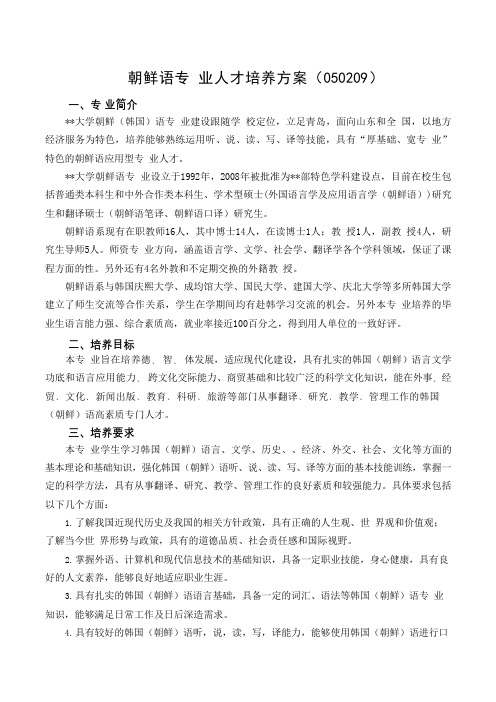
朝鲜语专业人才培养方案(050209)一、专业简介**大学朝鲜(韩国)语专业建设跟随学校定位,立足青岛,面向山东和全国,以地方经济服务为特色,培养能够熟练运用听、说、读、写、译等技能,具有“厚基础、宽专业”特色的朝鲜语应用型专业人才。
**大学朝鲜语专业设立于1992年,2008年被批准为**部特色学科建设点,目前在校生包括普通类本科生和中外合作类本科生、学术型硕士(外国语言学及应用语言学(朝鲜语))研究生和翻译硕士(朝鲜语笔译、朝鲜语口译)研究生。
朝鲜语系现有在职教师16人,其中博士14人,在读博士1人;教授1人,副教授4人,研究生导师5人。
师资专业方向,涵盖语言学、文学、社会学、翻译学各个学科领域,保证了课程方面的性。
另外还有4名外教和不定期交换的外籍教授。
朝鲜语系与韩国庆熙大学、成均馆大学、国民大学、建国大学、庆北大学等多所韩国大学建立了师生交流等合作关系,学生在学期间均有赴韩学习交流的机会。
另外本专业培养的毕业生语言能力强、综合素质高,就业率接近100百分之,得到用人单位的一致好评。
二、培养目标本专业旨在培养德﹑智﹑体发展,适应现代化建设,具有扎实的韩国(朝鲜)语言文学功底和语言应用能力﹑跨文化交际能力、商贸基础和比较广泛的科学文化知识,能在外事﹑经贸﹑文化﹑新闻出版﹑教育﹑科研﹑旅游等部门从事翻译﹑研究﹑教学﹑管理工作的韩国(朝鲜)语高素质专门人才。
三、培养要求本专业学生学习韩国(朝鲜)语言、文学、历史、、经济、外交、社会、文化等方面的基本理论和基础知识,强化韩国(朝鲜)语听、说、读、写、译等方面的基本技能训练,掌握一定的科学方法,具有从事翻译、研究、教学、管理工作的良好素质和较强能力。
具体要求包括以下几个方面:1.了解我国近现代历史及我国的相关方针政策,具有正确的人生观、世界观和价值观;了解当今世界形势与政策,具有的道德品质、社会责任感和国际视野。
2.掌握外语、计算机和现代信息技术的基础知识,具备一定职业技能,身心健康,具有良好的人文素养,能够良好地适应职业生涯。
53七年级上册2024小册子

53七年级上册2024小册子第一章:成为初中生新的一年开始了,我升入了初中,成为了一名七年级的学生。
初中生活对我来说是全新的,充满了挑战和机遇。
我要努力适应新的课程和学习方式,同时也要学会独立思考和处理问题。
第二章:适应新生活初中的生活和小学不同,我要面对更多科目和更多的作业。
我要学会合理安排时间,提高学习效率。
同时,我也要和新同学相处融洽,建立友谊。
我要学会独立处理问题,不再依赖家长和老师。
第三章:提升自我在新的学习环境中,我要学会积极主动,主动参与课堂讨论和活动。
我要多读书、多写作,提高自己的语文水平。
我还要多做题、多练习,提高数学和英语成绩。
我要努力学习科学知识,培养自己的逻辑思维能力。
第四章:拓展视野除了学习,我还要积极参加体育、艺术和实践活动,拓展自己的视野。
我要多参加社会实践活动,了解社会动态和民生问题,培养社会责任感和公民意识。
我要多参加文化艺术活动,欣赏优秀的文艺作品,提高自己的审美情趣。
第五章:健康成长在初中生活中,不仅要成绩优秀,还要身心健康。
我要养成良好的生活习惯,保持规律作息,多参加体育锻炼,保持身体健康。
我要注意心理健康,学会处理情绪,建立积极的心态,保持自信和乐观。
总结:初中生活充满了挑战和机遇,我要不断学习和进步,不断提升自己,成为一名全面发展的人才。
我要尊重师长,团结同学,努力学习,健康成长,为实现自己的梦想而努力奋斗。
愿新的一年,我能在初中生活中收获更多,成长更快,迈向成功的道路。
2022版53鲁教版英语九年级答案
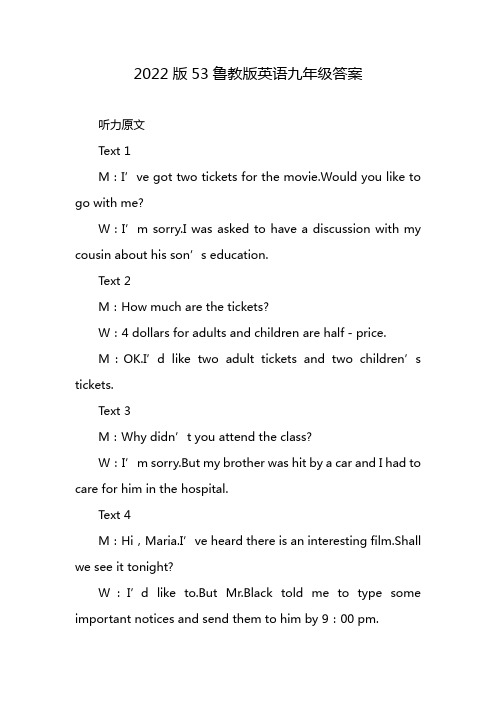
2022版53鲁教版英语九年级答案听力原文Text 1M:I’ve got two tickets for the movie.Would you like to go with me?W:I’m sorry.I was asked to have a discussion with my cousin about his son’s education.Text 2M:How much are the tickets?W:4 dollars for adults and children are half-price.M:OK.I’d like two adult tickets and two children’s tickets.Text 3M:Why didn’t you attend the class?W:I’m sorry.But my brother was hit by a car and I had to care for him in the hospital.Text 4M:Hi,Maria.I’ve heard there is an interesti ng film.Shall we see it tonight?W:I’d like to.But Mr.Black told me to type some important notices and send them to him by 9:00 pm.M:The job is the most important.Text 5W:Manhattan Square,please.M:All right,madam.When are we supposed to be there?W:I’d like to go around the city,if you don’t mind.Text 6M: Hello! This is City Police Station.W:I need help.My house has been broken into.M:Can you tell me some details?W:When I came home,I found my door broken,and my money,my jewelry,and my camera were gone.M:Was there anybody home?W:No.My son,husband,and I all happened to be out having our dinner after work.M:What is your address?W:No.13,Downing Street.Could you come over at once?M:OK.Don’t worry,madam.We’ll be there in 10 minutes.Text 7M:Hi.What can I do for you?W:I’m hunting for a part-time job.M:Then,you’ve come to the right place.Our office isaimed at helping those like you to find jobs.W:Glad to hear that.I really need to earn some money for my education.M:How many hours would you like to work?W:Ten to twenty hours a week.M:And when are you free to work?W:Every weekday since noon.And I wouldn’t mind working on weekends.M:Great.Now please fill out this form.W:When can I get to work?M:I will call you tomorrow.W:Thank you.Text 8M:This is Henry.I’d like to make sure when we can expect you for a get-together.W:Er...What party is it?M:Our former classmates are planning a get-together.W:Oh,that’s good.M:Are you free these days?W:A little busy somehow.M:Can you come this Saturday evening?W:I’m very sorry,I’ve promised to go to the movieswith my daughter.M:Well,how about Sunday then?W:That sounds fine.M:Good.Shall we make it at a quarter to seven?W:I’m sure to be there.Shall we have a dance after that?M:It’s up to you.I’ve learned a new dance these days.Then we can share it.W:That’s great.Text 9W:I’ll take part in a very important party for my friend Amy.M:Really?W:Amy has just been awarded the first prize for her English speech.M:Great.W:Today is her 26th birthday.M:Then you must buy a gift for her.W:What do you think I should buy for her?M:A birthday cake.W:No,she has got one from her boy friend.M:Then,what else?W:I think an MP3 player will be OK.M:Hasn’t she had one already?W:But it is broken.She likes music.I think it’s the best for her.M:You’re right.Then shall I drive you there?W:No.I’ll do it myself.You have to care for my pet dogs and cats.Text 10Hello,everyone.Welcome to our hospital.Now I’m going to tell you something about my hospital,Friendship Hospital.It looks very new and modern.But it has a history going back to three quarters of a century.It was designed to sleep 200 patients,and then 400.With the development of the new building blocks,it can now sleep 900 patients.It started its life as a general hospital.But now it has developed its new departments and become the teaching hospital that is famous all over the area.It has created new fields for treating heart diseases and eye diseases with a lot of experienced and famous doctors.During the teaching process,it includes a school of baby nursing.In 2001,the President along with the mayor visited the children from flooded areas,and on Christmas Day last year,the Prime Minister had lunch with the patients,talking about their life after the AIDS disease.Ⅰ.听力(共两节,满分30分)第一节(共5小题;每小题1.5分,满分7.5分)听下面5段对话。
韩国语日常用语162句

韩国语日常用语162句1.你好吗? 어떻게지내십니까? [ eotteoke jinaesimnikka ]2. 你好! 안녕하세요! [ annyeonghaseyo ]3.(向走的人) 再见! 안녕히가세요. [ annyeonghi gaseyo ]4.初次见面!처음뵙겠습니다. [ cheoeumboepgetseumnida ]5.认识您很高兴。
당신을알게되어기뻐요. [ dangsineulalgedoeeogippeoyo ]6.我叫韩大邱。
저는한대구입니다. [ jeoneunhandaeguimnida ]7.请多关照。
잘부탁드립니다. [ jalbutakdeurimnida ]8.(向留下的人) 再见! 안녕히계세요. [ annyeonghi gyeseyo ]9.好。
예. [ ye ]10.不是。
아니오. [ anio ]11.谢谢。
감사합니다. [ gamsahamnida ]12.不客气。
천만에요. [ cheonmaneyo ]13.对不起。
미안합니다. [ mianhamnida ]14.没关系。
괜찮습니다. [ gwaenchanseumnida ]15.吃饱了,谢谢。
잘먹었습니다. [ jal meogeotseumnida ]16.辛苦了。
수고하셨습니다. [ sugohasyeotseumnida ]17.请等一下。
잠시만요. [ jamsimanyo ]18我想预定房间。
방을예약하고싶습니다. [ bangeul yeyakhago sipseumnida ]19.有空房间吗?빈방있습니까? [ bin bang itseumnikka ]20.我要安静的房间。
조용한방을주세요. [ joyonghan bangeul juseyo ]21.我想现在入住。
지금체크인하고싶습니다. [ jigeum chekeuinhago sipseumnida ]22.我想存行李。
乐乐老师教你韩语生活口语(韩语零基础可学习)
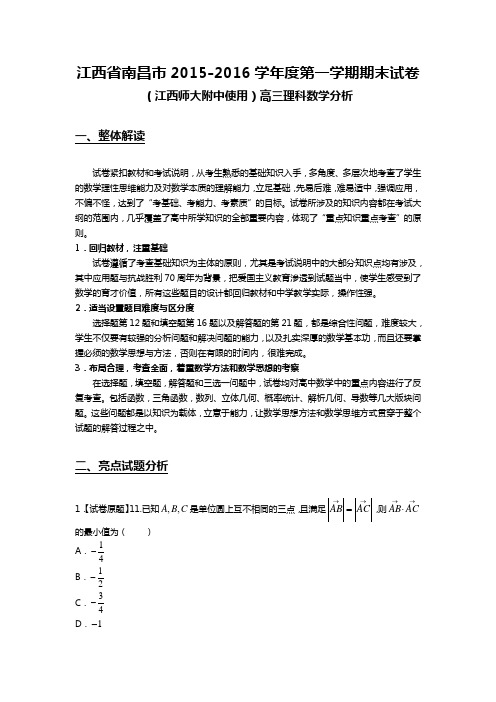
江西省南昌市2015-2016学年度第一学期期末试卷(江西师大附中使用)高三理科数学分析一、整体解读试卷紧扣教材和考试说明,从考生熟悉的基础知识入手,多角度、多层次地考查了学生的数学理性思维能力及对数学本质的理解能力,立足基础,先易后难,难易适中,强调应用,不偏不怪,达到了“考基础、考能力、考素质”的目标。
试卷所涉及的知识内容都在考试大纲的范围内,几乎覆盖了高中所学知识的全部重要内容,体现了“重点知识重点考查”的原则。
1.回归教材,注重基础试卷遵循了考查基础知识为主体的原则,尤其是考试说明中的大部分知识点均有涉及,其中应用题与抗战胜利70周年为背景,把爱国主义教育渗透到试题当中,使学生感受到了数学的育才价值,所有这些题目的设计都回归教材和中学教学实际,操作性强。
2.适当设置题目难度与区分度选择题第12题和填空题第16题以及解答题的第21题,都是综合性问题,难度较大,学生不仅要有较强的分析问题和解决问题的能力,以及扎实深厚的数学基本功,而且还要掌握必须的数学思想与方法,否则在有限的时间内,很难完成。
3.布局合理,考查全面,着重数学方法和数学思想的考察在选择题,填空题,解答题和三选一问题中,试卷均对高中数学中的重点内容进行了反复考查。
包括函数,三角函数,数列、立体几何、概率统计、解析几何、导数等几大版块问题。
这些问题都是以知识为载体,立意于能力,让数学思想方法和数学思维方式贯穿于整个试题的解答过程之中。
二、亮点试题分析1.【试卷原题】11.已知,,A B C 是单位圆上互不相同的三点,且满足AB AC →→=,则AB AC →→⋅的最小值为( )A .14-B .12-C .34-D .1-【考查方向】本题主要考查了平面向量的线性运算及向量的数量积等知识,是向量与三角的典型综合题。
解法较多,属于较难题,得分率较低。
【易错点】1.不能正确用OA ,OB ,OC 表示其它向量。
2.找不出OB 与OA 的夹角和OB 与OC 的夹角的倍数关系。
烟台韩语培训学校 5分钟学会韩语人称代词
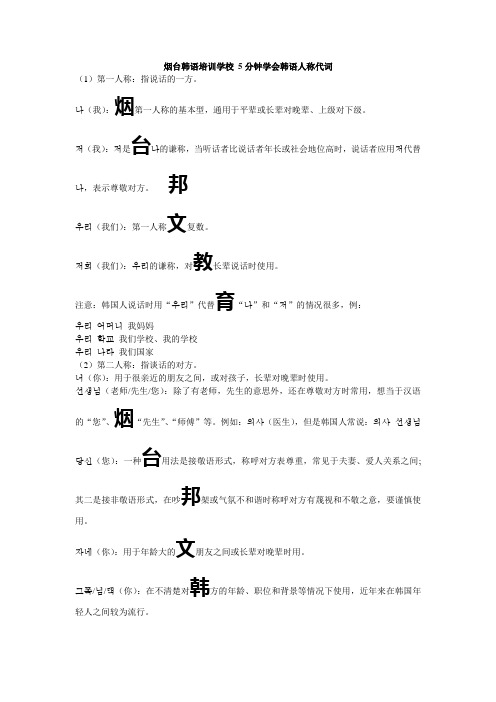
烟台韩语培训学校5分钟学会韩语人称代词(1)第一人称:指说话的一方。
나(我):烟第一人称的基本型,通用于平辈或长辈对晚辈、上级对下级。
저(我):저是台나的谦称,当听话者比说话者年长或社会地位高时,说话者应用저代替나,表示尊敬对方。
邦우리(我们):第一人称文复数。
저희(我们):우리的谦称,对教长辈说话时使用。
注意:韩国人说话时用“우리”代替育“나”和“저”的情况很多,例:우리어머니我妈妈우리학교我们学校、我的学校우리나라我们国家(2)第二人称:指谈话的对方。
너(你):用于很亲近的朋友之间,或对孩子,长辈对晚辈时使用。
선생님(老师/先生/您):除了有老师,先生的意思外,还在尊敬对方时常用,想当于汉语的“您”、烟“先生”、“师傅”等。
例如:의사(医生),但是韩国人常说:의사선생님당신(您):一种台用法是接敬语形式,称呼对方表尊重,常见于夫妻、爱人关系之间;其二是接非敬语形式,在吵邦架或气氛不和谐时称呼对方有蔑视和不敬之意,要谨慎使用。
자네(你):用于年龄大的文朋友之间或长辈对晚辈时用。
그쪽/님/댁(你):在不清楚对韩方的年龄、职位和背景等情况下使用,近年来在韩国年轻人之间较为流行。
注意:韩国人说话时,人称代词被省语略的情况比较常见。
例:어디에갑니까?(你)去哪里?培训학교에갑나다。
(我)去学校。
(3)第三人称:指说者,听者双方以外的第三者。
学校通常是在指示代词이,그和저后加上분(位)이(人,位)사람(人)等表示第三人称。
“아무,누구,어느”指未知、不定的第三人称,根据句子的同,意思也发生变化。
例子:누가방에있습니다。
有人在房间里。
누가있습니까?有谁在吗?(有人吗?)아무도없습니다。
谁都不在。
아무나오십시오。
请来个人吧。
자기:当主语时第三人称或时需要重复时使用。
例子:그사람은자기일은자기가합니다。
那人是自己的事情自己做。
그여자는자기아이이야기만합니다。
那女人只讲自己孩子的事情。
(4)人称代词本身有单数、复数之分。
五三英语试卷九年级25页【含答案】

五三英语试卷九年级25页【含答案】专业课原理概述部分一、选择题(每题1分,共5分)1. 在英语语法中,下列哪个词性可以表示事物的名称?A. 动词B. 名词C. 形容词D. 副词2. 下列哪个句子使用了正确的时态?A. He eat breakfast at 7 o'clock.B. She is going to the library yesterday.C. They will have finished the project next week.D. I have seen that movie last year.3. "The cat is _______ the mat." 空格处应填入哪个词?A. onB. inC. atD. to4. 下列哪个单词的发音与其他三个不同?A. bikeB. cakeC. makeD. take5. 下列哪个词组表示“经常”?A. AlwaysB. OftenC. SometimesD. Never二、判断题(每题1分,共5分)1. 英语中的冠词包括“a, an, the”。
()2. 现在分词和过去分词在英语中都是动词的一种形式。
()3. 英语中的被动语态结构是“主语 + be + 过去分词”。
()4. “I don't have many friends”和“I have few friends”意思相同。
()5. 英语中,疑问句的语序是将助动词放在主语之前。
()三、填空题(每题1分,共5分)1. My mother _______ (be) a teacher.2. He _______ (go) to the cinema last night.3. The sun _______ (rise) in the east.4. I _______ (not see) him for a long time.5. They _______ (finish) the work tomorrow.四、简答题(每题2分,共10分)1. 请简述一般现在时的用法。
朝鲜语词汇全集(四、2)
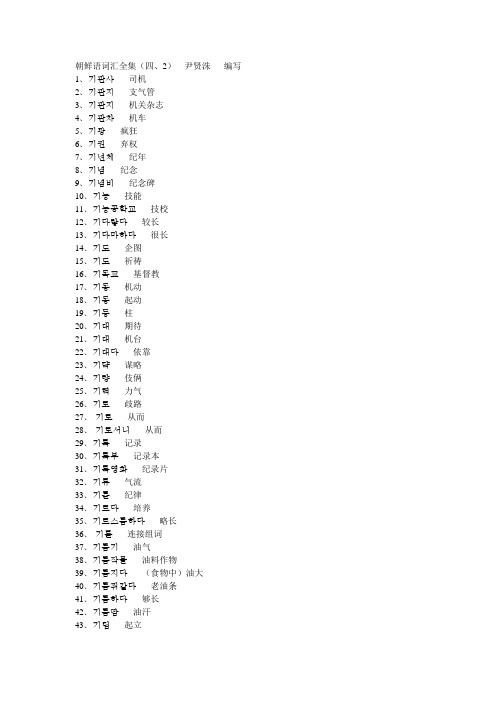
朝鲜语词汇全集(四、2)尹贤洙编写1、기관사-----司机2、기관지-----支气管3、기관지-----机关杂志4、기관차-----机车5、기광-----疯狂6、기권-----弃权7、기년체-----纪年8、기념-----纪念9、기념비-----纪念碑10、기능-----技能11、기능공학교-----技校12、기다랗다-----较长13、기다마하다-----很长14、기도-----企图15、기도-----祈祷16、기독교-----基督教17、기동-----机动18、기동-----起动19、기둥-----柱20、기대-----期待21、기대-----机台22、기대다-----依靠23、기략-----谋略24、기량-----伎俩25、기력-----力气26、기로-----歧路27、-기로-----从而28、-기로서니-----从而29、기록-----记录30、기록부-----记录本31、기록영화-----纪录片32、기류-----气流33、기률-----纪律34、기르다-----培养35、기르스름하다-----略长36、-기를-----连接组词37、기름기-----油气38、기름작물-----油料作物39、기름지다-----(食物中)油大40、기름쥐같다-----老油条41、기름하다-----够长42、기름땀-----油汗43、기립-----起立45、기마병-----骑兵46、기만-----期满47、기명-----记名48、기명투표----记名投票49、기묘하다-----奇妙50、기문-----奇闻51、기물-----器物52、기미-----黑痣53、기미-----眼力见54、기민하다-----机敏55、기밀-----机密56、기맥-----气派57、기박하다-----浅薄58、기반-----盘面59、기발-----旗帜60、기발하다-----奇发61、기법-----技法62、기별-----寄语63、기병-----骑兵64、기보-----乐谱65、기복-----起伏66、기본-----基本67、기본건설-----基本建设68、기본고리-----基本环节69、기봉-----奇峰70、기부-----捐款71、기부금-----捐款金72、기분-----气氛73、기백-----气魄74、기사-----技师75、기사-----记事、纪实76、기사-----骑士77、기상-----起床78、기상-----气象79、기상-----状态80、기상천외-----异想天开81、기석-----奇石82、기선-----汽船83、기성-----既成84、기서품-----既成品85、기소-----起诉86、기수-----奇数87、기수-----旗手89、기수-----机头90、기수부지-----不计其数91、기숙-----寄宿92、기숙사-----寄宿舍93、기숙생-----寄宿生94、기술-----技术95、기술혁신-----技术革新96、기술인재-----技术人才97、기술원-----技术员98、기스락-----屋檐99、기스락물-----屋檐水100、기슭-----山脚、江边、衣领袖等。
以《巴里公主》为例谈韩语教学
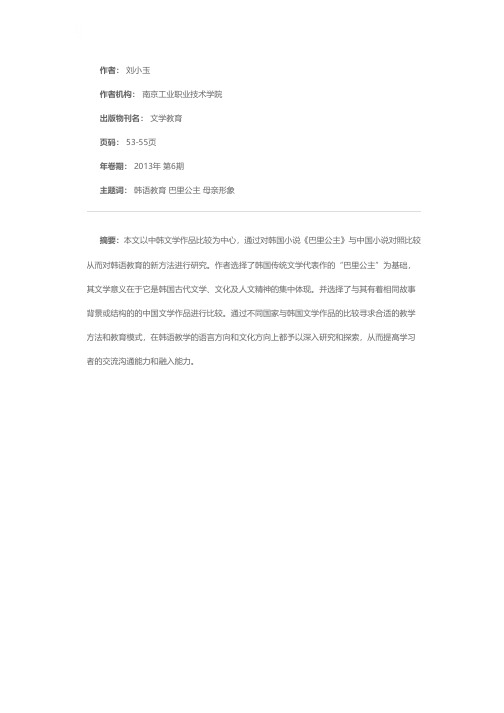
作者: 刘小玉
作者机构: 南京工业职业技术学院
出版物刊名: 文学教育
页码: 53-55页
年卷期: 2013年 第6期
主题词: 韩语教育 巴里公主 母亲形象
摘要:本文以中韩文学作品比较为中心,通过对韩国小说《巴里公主》与中国小说对照比较从而对韩语教育的新方法进行研究。
作者选择了韩国传统文学代表作的“巴里公主”为基础,其文学意义在于它是韩国古代文学、文化及人文精神的集中体现。
并选择了与其有着相同故事背景或结构的的中国文学作品进行比较。
通过不同国家与韩国文学作品的比较寻求合适的教学方法和教育模式,在韩语教学的语言方向和文化方向上都予以深入研究和探索,从而提高学习者的交流沟通能力和融入能力。
cata log

National Education Policiesand ProgrammesC o u n t r y Case Studies and Re s e a r c h1989-1999Education Se c t o rDivision for the Re c o n s t r uction and Deve l o p m e n tof Education Sy s t e msThe documents and publications referred to in this catalogue have been produced between 1989 and 1999 in the framework of UNESCO's education 'upstream' support services to Member States. They concern activities undertaken by or with support of BER/PSA (before 1996) and the ED/ERD Divisions designed to support the elaboration of sector-wide national policies, strategies and action plans for the reconstruction and reform of education systems in Member States in the framework of international development cooperation. Documents are related to country-based activities and, to a lesser degree, to cross-country activities under international working groups and partnerships.The database which serves for the elaboration of this catalogue is updated regularly and is available for consultation at the Office for Administration and Information of the Education Sector, UNESCO, Paris, as well as at UNESCO's field offices and education institutes throughout the world. It will also be made available through Internet at UNESCO (ED/ERD) Website in the near future. The documents themselves may be consulted at or requested from the Office for Administration and Information (ED/OAI) at UNESCO Paris Headquarters. The user should be aware of the special nature of this documentary collection which covers a broad variety of documents - from official government and agency documents and publications - to internal and working documents, frequently unofficial, and that they wary widely in quality, completeness and degree of reliability.Analysis and information presented in the individual documents are those provided by the authors and do not necessarily bear the endorsement of UNESCO.ED/99/WS/FOREWORDFor many years UNESCO has co-operated with other Agencies to assist its Member States in the preparation of suitable education projects for international co-operation and funding. This particular aspect of international co-operation is called the 'upstream' phase as it involves the analysis of the educational situation, the definition of country policies and strategies, the drawing up of plans, programmes and projects prior to their actual launching under what is generally referred to as the 'downstream" phase.Since the 1980s, UNESCO has intensified its efforts to provide 'upstream' services to the Member States in response to the changing conditions in international development co-operation. This co-operation is increasingly focussed on sector-wide policies as opposed to the traditional sub-sector and individual projects approaches. At the same time a large number of countries are increasingly dependant on external financing for their educational investments, particularly the Least Developed Countries. Those countries are doubly dependant on external funding agencies, in particular the World Bank, which holds a leading position both from the financial and technical assistance points of view. In this context multilateral and bilateral funding agencies are often perceived as wielding undue influence on the agenda for national policy analysis and formulation as well as on the investments made by other Organizations and external partners.In the area of upstream work, UNESCO has earned a reputation as an "honest broker' for its professional independence and sensitivity to the interests of the countries it is servicing.A specific unit for the provision of upstream services was created at UNESCO Headquarters in 1990 in order to respond adequately to the growing demand for such services and was subsequently integrated into the Education Sector in 1996, as part of the Division for the Reconstruction and Development of Education Systems (ED/ERD). The aim was to support national leadership in the preparation of national strategies and action plans, as well as in the mobilisation of national and external resources, both intellectual and financial, which are required for sound and independent policy analyses work. Emphasis is placed on national capacity building, enhancing negotiation skills for policy dialogue and donor co-ordination.UNESCO has provided education upstream services to well over 30 Member States during the present decade, with special attention being paid to the Least Developed Countries in Africa and South East Asia, as well as to countries undergoing rapid political and economic transition or in post-conflict reconstruction. In recent years, upstream activities have been broadened to encompass several complementary cross-country initiatives, such as the regional Working Group on Education Sector Analysis (WGESA) within the framework of the Association for the Development of Education in Africa (ADEA), as well as inter-agency partnerships on educational reform and international co-operation.The present catalogue contains bibliographical references of those working documents and research publications produced from 1989 to 1999, either by or with the support of the former division for Policies and Sector Analysis (BER/PSA) before its integration into the ED Sector in 1996 and the ED/ERD Division, as part of UNESCO's education upstream support services to Member States.The catalogue is primarily addressed to professionals, researchers and students undertaking field research and operational work related to the elaboration of national education policies and programmes within the framework of development co-operation. Although it includes numerous unofficial and internal working papers which vary widely in quality, form or presentation it provides a wealth of methodological, historical and contextual data which we hope will prove useful for information and research purposes. It is also hoped that this initiative will contribute to increasing the dissemination and utilization of field-related information and analysis in international co-operation.Lucila Jallade M. Asghar HusainDivision for the Reconstruction andDevelopment of Education Systems(ED/ERD)CONTENTSDocuments classification categories (i)Keywords (ii)Documents by country§Albania (1)§Benin (1)§Bosnia and Herzegovina (8)§Burkina Faso (9)§Cambodia (11)§Chad (12)§Comoros (15)§Congo (Republic) (15)§Congo (Democratic Republic) (16)§Costa Rica (16)§Ethiopia (17)§Gabon (17)§Ghana (17)§Haiti (18)§Lebanon (18)§Lesotho (20)§Mali (20)§Mauritius (23)§Morocco (24)§Mozambique..................... ..... (24)§Myanmar (24)§Palestinian Autonomous Territories (30)§Papua New Guinea...................................... .. (30)§Republic of South Africa (30)§Rwanda (30)§Sao Tome and Principe (31)§Senegal (31)§Sri Lanka.. (31)§Vietnam................ (31)§Zimbabwe (32)Cross-country documentsWorking Group on Education Sector Analysis (WGESA) for theAssociation for the Development of African Education (ADEA) (34)Other documents and publications (36)DOCUMENTS CLASSIFICATION CATEGORIES1.Project Documents and RevisionsStandardised and official documents containing the problem statement, project objectives and expected results. Project documents retained in this catalogue concern selected country upstream services and may be used as practical examples for the development of further projects in similar areas.2.Country Sector Reviews and StudiesSector-wide reviews and /or analyses of the education system in a given country (in-depth briefs, needs-assessment report). Usually they provide a synthetic view of the sector, including statistical and institutional information, identification and analysis of issues as well as the priority areas for educational development.3.Country Sub-Sectoral/Thematic StudiesAs above but covering a specific sub-sector or theme. These studies usually serves as inputs for sector-wide reviews. Most internal national and international consultancy reports fall under this category.4.Country Policy/Strategy Documents and Action PlansPresentation of national policy or strategy and /or action plans or programme for the development of the education sector or a sub-sector in a given country. They may include detailed action or investment plans with related costing and a summary of the sector or sub-sector situation as well as the related statistical information. Documents submitted to donor round tables/consultations are included in this category.5.Mission ReportsReports produced by UNESCO staff or consultants upon return from missions to a given country undertaken in connection with upstream projects and studies. They refer to the mission's context and activities, present follow-up proposals and frequently provide a preliminary substantive report on a given subject.6.Project Reviews and Evaluation/Final ReportsDescriptive and/or analytical reports on the progress, results and lessons learnt from a given project.7.Training/Workshop MaterialsSpecific documentation concerning training activities, national workshops and seminars undertaken in connection with upstream activities.8.Other project based documents and miscellaneousOther documents not elsewhere classified.9.Publication/Research/Methodology PapersCase studies, generic and or reflective papers and publications referring to international experience in the field of education sector analysis, educational policy and programme development, international aid and related subjects. Most of the papers are closely connected to the experience resulting from the projects and documents listed in the catalogue and database. They may directly refer to one region, sub-region or country.KEYWORDS AAction planAdult educationAfrica regionAsian regionALBANIAAuditsAusterityBBasic educationBENINBilateral agencies BOSNIA AND HERZEGOVINA BURKINA FASOCCAMBODIACapacity buildingCHADCOMOROS Comparative education CONGOCONGO DRContinuing education CurriculumDDecentralisation DemographyDeveloping countries Development aidDonors coordination DropoutsEEducation sector analysis Educational administration Educational costs Educational decentralization Educational evaluation Educational facilities Educational finance Educational innovations Educational management Educational management information system Educational organisation Educational personnel Educational planning Educational policy Educational policy analysis Educational projects Educational reconstructionEducational qualityEducational reformEducational researchEducational statisticsEducational strategiesEducational supervisionEducational systemsEmploymentETHIOPIAExternal aidFFunctional analysisGGABONGeneral educationGHANAGUINEAHHAITIHigher educationHuman developmentHuman resources developmentIInstitutional developmentInternational developmentcooperationInternational educationInter-regional issuesInvestment plan/programmeLLeast developed countriesLEBANONLESOTHOLiteracyMMacro-economic frameworkMADAGASCARMALIMaster planMAURITANIAMAURITIUSMOROCCOMOZAMBIQUEMultilateral agenciesMultilateralismMYANMARNNonformal educationNon-governmental organisationPPALESTINEPAPUA NEW GUINEAPedagogyPoverty alleviationPre-school educationPrimary educationPrivate educationRRWANDASSAO TOME AND PRINCIPESchool mappingScience educationSecondary educationSENEGALSimulation modelSkills developmentSocio-economic contextSocio-economic indicatorsSOUTH AFRICASpecialised educationSRI LANKAStructural adjustmentSUB-SAHARAN AFRICATTeacher educationTeacher effectivenessTeacher trainingTeaching materialsTeaching staffTechnical and vocationaleducationTextbooksTripartite reviewVVIETNAMVocational trainingWWomen educationWorkshop materialsZZIMBABWEDOCUMENTS BY COUNTRYALBANIA / ALBANIE1Albania: Education Donors Consultation. By BAHR, Klaus. (English)UNESCO, 1993. (5. Mission Reports)ALB/93/5 (UNESCO - PSA)Keywords: ALBANIA; Donors coordination; Educational policy; Educational projects; Educationalreform;1Intersectoral Mission to Albania, 28 January to 4 February 1998. By CHANG, Gwang-Chol. (English) UNESCO, 1998. 14 p. (5. Mission Reports)ALB/98/5 (UNESCO - ERD)Keywords: ALBANIA; Educational projects; Educational reconstruction; Development cooperation;Socio-economic context;1Policy paper on major educational issues. Dokument mbi problemet kryesore lidhur me politiken arsimore. By COHEN, Marc; MALAN, Thierry. (English/Albanese)UNDP/UNESCO/Ministry of Education, 1993. 50 p. (2. Country Sector Reviews and Studies)ALB/93/2 (UNESCO - PSA)Keywords: ALBANIA; Educational policy; Educational reform; Institutional development; Educational Systems;1Strengthening management and planning capacities in the education sector. By Projectteam. (English)UNDP/UNESCO, 1996. 35p. (1. Project Documents and Projects Revisions)ALB/96/1 (UNESCO/UNDP)Keywords: ALBANIA; Capacity building; Educational management; Educational administration;1Terminal report (ALB/96/002). By CHANG, Gwang-Chol. (English)UNESCO - UNDP, 1998. 14p. (6. Project Reviews and Evaluations/Final Reports)ALB/98/6 (UNESCO - ERD)Keywords: ALBANIA; Capacity building; Educational administration; Educational management; BENIN / BENIN1Aide mémoire. Annuaire statistique de l'enseignement primaire. By RAKOTOMALALA, Ramahatra. (French)UNDP/UNESCO, 1991. (3. Country Sub-sectoral/Thematic Studies)BEN/89/8 (UNESCO - PSA)Keywords: BENIN; Educational statistics; Education sector analysis;1L'analyse de politique éducative au Bénin. By Project team. (French)UNDP/UNESCO, 1993. 13p.+Annex (8. Other project based documents and miscellaneous)BEN/89/8 (UNESCO - PSA)Keywords: BENIN; Educational policy; Education sector analysis;1Analyse des autres sous-secteurs éducatifs. L'enseignement secondaire. By COSSI,Calixte. (French)UNDP/UNESCO, 1991. 4p. (3. Country Sub-sectoral/Thematic Studies)BEN/89/3 (UNESCO - PSA)Keywords: BENIN; Secondary education; Education sector analysis;1Analyse du système éducatif béninois. By Project team. (French)UNDP/UNESCO, 1990. 231 p. (2. Country Sector Reviews and Studies)BEN/89/2 (UNESCO - PSA, Coopération française)Keywords: BENIN; Educational policy; Educational sector analysis;1L'analyse fonctionnelle' Audit de l'organisation et du management du Ministère de l'Education Nationale'. By AHANHANZO, Joseph. Son intégration avec le projet d'analyses des politiques éducatives': Cas du Bénin (French)UNDP/UNESCO, 1992. 7p. (8. Other project based documents and miscellaneous)BEN/89/8 (UNESCO - PSA)Keywords: BENIN; Educational management; Audits; Education sector analysis;1L'analyse fonctionnelle (audit) de l'organisation et du management du Ministère del'Education nationale du Bénin. By Audit team. (French)UNDP/UNESCO, 1991. 96p. (3. Country Sub-sectoral/Thematic Studies)BEN/89/3 (UNESCO - PSA)Keywords: BENIN; Educational management; Audits;1Analyse des autres sous-secteurs éducatifs. Enseignement supérieur. By ZINSOU,Prudencia A. (French)UNDP/UNESCO, 1991. 4p. (3. Country Sub-sectoral/Thematic Studies)BEN/89/3 (UNESCO - PSA)Keywords: BENIN; Higher education; Education sector analysis;1Analyse des sous-secteurs éducatifs / L'enseignement technique et professionnel (ETP).By MENSAH, Laurentin. (French)UNDP/UNESCO, 1991. 6p. (3. Country Sub-sectoral/Thematic Studies)BEN/89/3 (UNESCO - PSA)Keywords: BENIN; Technical and vocational education; Education sector analysis;1Annuaire statistique de l'enseignement primaire 1990. By Project team. (French) UNDP/UNESCO, 1991. 30p. (3. Country Sub-sectoral/Thematic Studies)BEN/89/3 (UNESCO - PSA)Keywords: BENIN; Educational statistics; Education sector analysis;1Approvisionnement en manuels scolaires au Bénin. By CHATRY-KOMAREK, Marie;GOLDBERG, Jörg. (French)UNDP/UNESCO, 1989. 142p. (3. Country Sub-sectoral/Thematic Studies)BEN/89/3 (UNESCO - PSA)Keywords: BENIN; Textbooks; Education sector analysis;1Les aspects socio-culturels de la fréquentation scolaire des filles au niveau primaire auBénin. By AKPAKA, Odile; GABA, Léa. (French)UNDP/UNESCO, 1991. 49p. (3. Country Sub-sectoral/Thematic Studies)BEN/89/3 (UNESCO - PSA)Keywords: BENIN; Women education; Education sector analysis;1Assistance à la formulation d'une politique et d'un programme d'investissement pour lesecteur de l'éducation au Bénin. By DADO, A. Codjo. (French)UNDP/UNESCO, 1990. 119p. (3. Country Sub-sectoral/Thematic Studies)BEN/89/3 (UNESCO - PSA; UNDP)Keywords: BENIN; Teacher training; Educational costs; Education sector analysis;1Assistance à la formulation d'une politique nationale et d'un programme d'investissements pour le secteur de l'éducation au Bénin. By CLIGNET, GAYE, KOSBI et al. (Rapportd'évaluation) (French)UNDP/UNESCO, 1993. 47p.+ Annex (6. Project Reviews and Evaluations/Final Reports)BEN/89/6 (UNESCO - PSA)Keywords: BENIN; Development cooperation;1Assistance à la formulation d'une politique nationale et d'un programme d'investissements pour le secteur de l'Education au Bénin. By Project team. (French)UNDP/UNESCO/Ministry of Education, 1990. 74 p. (1. Project Documents and Projects Revisions) BEN/89/1 (UNESCO - PSA)Keywords: BENIN; Educational policy; Educational sector analysis;1Assistance à la formulation d'une politique nationale et d'un programme d'investissements pour le secteur de l'éducation. By Project team. Conclusions et recommendations relativesau projet (French)UNDP/UNESCO, 1989. 10p.+Annex (8. Other project based documents and miscellaneous)BEN/89/8 (UNESCO - PSA)Keywords: BENIN; Educational policy; Education sector analysis; Action plan; Developmentcooperation;1Audit du Ministère de l'éducation nationale de la République du Bénin. By DHERSIGNY, Alain. (French)UNDP/UNESCO, 1991. (3. Country Sub-sectoral/Thematic Studies)BEN/89/3 (UNESCO - PSA)Keywords: BENIN; Audits; Educational management; Educational costs;1Audit du Ministère de l'Education nationale de la République du Bénin. By Audit team.UNDP/UNESCO, 1991. 23p. (7. Training / Workshops Materials)BEN/89/7 (UNESCO - PSA)Keywords: BENIN; Educational management; Audits; Workshop materials;1Audit d'organisation et de management du Ministère de l'Education Nationale, Sous-auditde management des ressources humaines. By AGONSOU, Marc; SAIDI, Mahieddine.UNDP/UNESCO, 1992. 82 p. (3. Country Sub-sectoral/Thematic Studies)BEN/89/3 (UNESCO - PSA)Keywords: BENIN; Educational personnel; Educational management; Audits; Educational sector analysis 1Audit d'organisation et de management du Ministère de l'Education nationale du Bénin. ByAudit team. (French)UNDP/UNESCO/Ministry of Education, 1991. 102p. (3. Country Sub-sectoral/Thematic Studies)BEN/89/3 (UNESCO - PSA)Keywords:BENIN; Educational personnel; Audits; Education sector analysis;1La chaîne éditoriale au Bénin. By Project team. (French)UNDP/UNESCO, 1991. 75 p. (3. Country Sub-sectoral/Thematic Studies)BEN/89/3 (UNESCO-PSA)Keywords: BENIN; Textbooks; Sector analysis;1Compte rendu de l'atelier régional sur l'analyse de politiques éducatives. By Workshopteam. (French)UNDP/UNESCO, 1994. (7. Training / Workshops Materials)BEN/89/7 (UNESCO - PSA)Keywords: BENIN; Educational policy; Education sector analysis; Development cooperation;Workshop Materials;1Compte rendu de la réunion d'examen tripartite du projet BEN/89/001. By Project team.UNDP/UNESCO/Ministry of Education, 1991. 26p. (6. Project Reviews and Evaluations/Final Reports) BEN/89/6 (UNESCO - PSA)Keywords: BENIN; Educational policy; Education sector analysis; Action plan; Developmentcooperation;1Compte rendu de la réunion d'examen tripartite du projet BEN/89/001. By Project team.UNDP/UNESCO/Ministry of Education, 1990. 7p. (6. Project Reviews and Evaluations/Final Reports)BEN/89/6 (UNESCO - PSA)Keywords: BENIN; Educational policy; Education sector analysis; Action plan; Developmentcooperation;1Contribution à l'étude de la problématique de l'établissement des priorités et des relationsentre sous-secteurs éducatifs. By AGONSANOU, Marc. (French)UNDP/UNESCO, 1993. 6p. (3. Country Sub-sectoral/Thematic Studies)BEN/89/3 (UNESCO - PSA)Keywords: BENIN; Educational policy; Education sector analysis;1Contributions aux travaux des états généraux de l'éducation. By Project team. (French) UNDP/UNESCO, 1990. (7. Training / Workshops Materials)BEN/89/7 (UNESCO - PSA)Keywords: BENIN; Educational policy; Education sector analysis; Workshop materials;1Coûts et financement de l'éducation au Bénin. By CARNOY, Martin; AGONSANOU, Marc.UNDP/UNESCO, 1990. 60 p. (3. Country Sub-sectoral/Thematic Studies)BEN/89/3 (UNESCO - PSA)Keywords: BENIN; Educational costs; Educational finance; Education sector analysis;1Document de fin de projet. By Project team. (French)UNDP/UNESCO, 1993. 155p. (6. Project Reviews and Evaluations/Final Reports)BEN/89/5 (UNESCO - PSA)Keywords: BENIN; Educational policy; Education sector analysis; Action plan; Development cooperation;1Document de référence concernant le projet BEN/89/001. By Project team. (French) UNDP/UNESCO, 1989. 88p. (8. Other project based documents and miscellaneous)BEN/89/8 (UNESCO - PSA)Keywords: BENIN; Educational policy; Education sector analysis; Action plan; Development cooperation;1L'éducation non formelle et les groupements de production des femmes. By AKPAKA,Odile; GABA, Léa. (French)UNDP/UNESCO, 1990. 66 p. (3. Country Sub-sectoral/Thematic Studies)BEN/89/3 (UNESCO - PSA)Keywords: BENIN; Nonformal education;1Effectifs normatifs cibles du MEN. By Audit team. (French)UNDP/UNESCO, 1992. 32 p. (3. Country Sub-sectoral/Thematic Studies)BEN/89/3 (UNESCO-PSA)Keywords: BENIN; Education sector analysis; Educational management; Educational personnel;1Enseignement secondaire. By Project team. (French)UNDP/UNESCO, 1989. 16p. (7. Training / Workshops Materials)BEN/89/7 (UNESCO - PSA)Keywords: BENIN; Workshop materials; Education sector analysis;1L'enseignement secondaire au Bénin: Diagnostic et propositions. By LAMOURE, Jeannne;COSSI, Calixte. (French)UNDP/UNESCO, 1991. (3. Country Sub-sectoral/Thematic Studies)BEN/89/3 (UNESCO - PSA)Keywords: BENIN; Secondary education; Education sector analysis;1L'enseignement supérieur au Bénin: Bilan et perspectives. By LAMOURE, Jeanne.UNDP/UNESCO, 1990. 46 p.+Annex (3. Country Sub-sectoral/Thematic Studies)BEN/89/3 (UNESCO - PSA; Coopération française)Keywords: BENIN; Higher education; Education sector analysis;1L'enseignement supérieur au Bénin: Réflexions et propositions. By HUGUET, Jean-Pierre.(French)UNDP/UNESCO, 1992. 81 p. (3. Country Sub-sectoral/Thematic Studies)BEN/89/3 (UNESCO - PSA; Coopération française)Keywords: BENIN; Higher education;1L'enseignement technique et professionnel au Bénin et la préparation à la vie active. ByLAMOURE, Jean. (French)UNDP/UNESCO, 1990. 37 p. (3. Country Sub-sectoral/Thematic Studies)BEN/89/3 (UNESCO - PSA)Keywords: BENIN; Employment; Technical and vocational education; Education sector analysis;1Etude sur l'enseignement technique et professionnel. By Project team. (French) UNDP/UNESCO, 1991. 116p. (3. Country Sub-sectoral/Thematic Studies)BEN/89/3 (UNESCO - PSA)Keywords: BENIN; Technical and vocational education;1Etude sur la formation initiale et continue des enseignants du préscolaire et de l'éducation de base. By BERRUER, André; AGOSSOU, Honoré. (French)UNDP/UNESCO, 1990. 21 p. (3. Country Sub-sectoral/Thematic Studies)BEN/89/3 (UNESCO - PSA)Keywords: BENIN; Teacher training; Education sector analysis;1Etudes analytiques de politique éducative et élaboration d'outils de management. By Audit team. (French)UNDP/UNESCO, 1991. 60p. (3. Country Sub-sectoral/Thematic Studies)BEN/89/3 (UNESCO - PSA)Keywords: BENIN; Educational management; Audits;1Evaluation analytique de l'enseignement primaire au Bénin. By JAROUSSE, Jean-Pierre;MINGAT, Alain. (French)UNDP/UNESCO, 1991. 85p. (3. Country Sub-sectoral/Thematic Studies)BEN/89/3 (UNESCO - PSA)Keywords:BENIN;Primary education; Education sector analysis;1Les fonctions et postes-clefs du Ministère de l'Education nationale du Bénin. By Auditteam. (French)UNDP/UNESCO, 1992. 61p. (3. Country Sub-sectoral/Thematic Studies)BEN/89/3 (UNESCO; SCHENE)Keywords: BENIN; Educational management; Education sector analysis; Audits;1Formation continue des enseignants et réseau d'animation pédagogique. By Project team. (French)UNDP/UNESCO, 1991. (3. Country Sub-sectoral/Thematic Studies)BEN/89/3 (UNESCO - PSA)Keywords: BENIN; Teacher training; Education sector analysis;1Manuels scolaires et matériel didactique. By Project team. (French)UNDP/UNESCO, 1991. (3. Country Sub-sectoral/Thematic Studies)BEN/89/3 (UNESCO - PSA)Keywords: BENIN; Textbooks; Educational materials; Education sector analysis;1Modèle de dialogue d'analyse sectorielle. Le modèle du Bénin. By ADANHO, Parfait.UNDP/UNESCO, 1992. 8p. (3. Country Sub-sectoral/Thematic Studies)BEN/89/3 (UNESCO - PSA)Keywords: BENIN; Simulation model; Education sector analysis;1Modèle de simulation financière du système éducatif béninois. By ADANHO, Parfait;HAZOUME, Christian. (French)UNDP/UNESCO, 1992. 57 p. (3. Country Sub-sectoral/Thematic Studies)BEN/89/3 (UNESCO - PSA)Keywords: BENIN; Simulation model;1Plan d'action de mise en oeuvre des recommandations de l'audit pour les ressourceshumaines. By Audit team. (French)UNDP/UNESCO, 1992. (3. Country Sub-sectoral/Thematic Studies)BEN/89/3 (UNESCO - PSA)Keywords: BENIN; Action plan; Educational management; Audits;1Les plans d'action de la réforme du secteur de l'éducation du Bénin: Chiffrage, synthèse etrecommandations. By SAIDI, Mahieddine; DHERSIGNY, Alain; EMIN, Jean-Claude;SACK, Richard. (French)UNDP/UNESCO/Ministry of Education, 1993. 243p. (4. Country Policy/Strategy Documents/Action plans)BEN/89/4 (UNESCO - PSA)Keywords: BENIN; Action plan; Educational reform;1Plan de mise en oeuvre de l'audit. By Audit team. (French)UNDP/UNESCO, 1992. 16p. (4. Country Policy/Strategy Documents/Action plans)BEN/89/4 (UNESCO - PSA)Keywords: BENIN; Educational personnel; Educational management; Audits; Action plan;1Pour la promotion de la scolarisation des filles au Bénin. By AKPAKA, Odile; GABA, Léa.(French)UNDP/UNESCO, 1992. 29 p. (3. Country Sub-sectoral/Thematic Studies)BEN/89/3 (UNESCO - PSA)Keywords: BENIN; Women education; Education sector analysis;1Présentation générale des plans d'action de la mise en oeuvre de l'audit. By Project team.(French)UNDP/UNESCO, 1992. 17p. (3. Country Sub-sectoral/Thematic Studies)BEN/89/3 (UNESCO - PSA)Keywords: BENIN; Action plan; Audits; Educational management;1Processus d'élaboration d'une politique éducative dans un contexte d'ajustementstructurel. By DEBOUROU, Djibril M. (French)UNDP/UNESCO, 1992. 8p. (3. Country Sub-sectoral/Thematic Studies)BEN/89/3 (UNESCO - PSA)Keywords: BENIN; Educational policy; Education sector analysis; Structural adjustment;1Programmes et examens (enseignements primaire et secondaire). By GAUTHIER, RogerFrançois. (French)UNDP/UNESCO, 1991. 30p. (3. Country Sub-sectoral/Thematic Studies)BEN/89/3 (UNESCO - PSA)Keywords: BENIN; Curriculum; Education sector analysis; Primary education; Secondary education; 1PSA mission reports 1989-1992. By Mission teams. (English/French)UNDP/UNESCO, 1992. (5. Mission Reports)BEN/89/5 (UNESCO - PSA)Keywords: BENIN; Education sector analysis; Educational policy; Development cooperation;1Rapport diagnostic. By LE GAY, Jean-Claude. (French)UNDP/UNESCO, 1991. 45 p. (3. Country Sub-sectoral/Thematic Studies)BEN/89/3 (UNESCO-PSA)Keywords: BENIN; Educational sector analysis; Educational management; Educational personnel;Audits;1Rapport de prédiagnostic sur l'organisation et les méthodes du secteur de l'éducationnationale du Bénin. By MENSAH, Laurentin; SAIDI, Mahieddine. (French)UNDP/UNESCO, 1991. 44p. (3. Country Sub-sectoral/Thematic Studies)BEN/89/3 (UNESCO - PSA)Keywords: BENIN; Educational management; Audits;1Rapport de misssion au Bénin du 9 au 17 mai 1992. By MONNERIE, Gilles. (French) UNDP/UNESCO, 1992. (5. Mission Reports)BEN/89/5 (UNESCO - PSA)Keywords: BENIN; Educational policy; Education sector analysis; Development cooperation;1Rapport d'activités (septembre 1989 - novembre 1992). By DEBOUROU, Djibril. (French) UNDP/UNESCO, 1992. 96p. (6. Project Reviews and Evaluations/Final Reports)BEN/89/6 (UNESCO - PSA)Keywords: BENIN; Educational policy; Education sector analysis; Development cooperation;。
韩国汉语教育的现状与未来_孟柱亿(1)
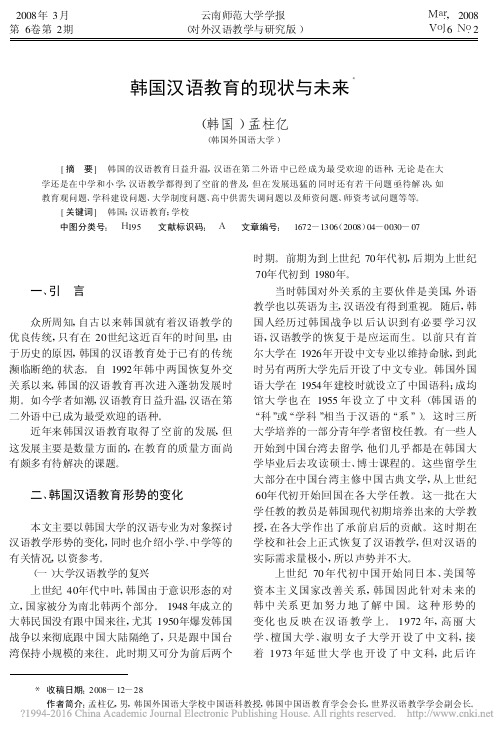
上世纪 70 年代初中国开始同日本 、美国等 资本主义国家改善关系 , 韩国因此针对未来的 韩中关系更加努力地了解中国 。这种形势的 变化 也 反 映 在 汉 语 教 学 上 。 1972 年 , 高 丽 大 学 、檀国大学 、淑明 女子 大学开 设了中 文科 , 接 着 1973 年延 世大 学 也 开设 了 中 文科 , 此 后许
到了 1980年 , 设有有关汉语的科系的大学总 共达到 30所 , 在不到十年的时间内增加了 10倍 。 本科毕业生人数多了 , 就引起硕士 、博士课程的增 设 。在上世纪 70年 代初设有研究生 院 (韩国叫 “大学院 ”)的大学只有首尔大学 1所 , 到了 1980 年就增加到 7所大学 。 上世纪 70年代中期去中 国台湾留学的人剧增 , 他们大部分专攻古典文学 , 获得硕士以上学位后又回国当各大学的教员 。 上 世纪 70年代末发生了一件在汉语教学史上值得 一提的事情 , 即韩国外国语大学在 1979年设立了 “同时通译大学院 ”。 同时通译 大学院是为对付 日益增加的国际会议及其他国际交流活动而成立
的硕士课程 , 其宗旨为培养同声传译 , 汉语是主要 的教学语种之一 。现在该课程毕业生在国际交流 中发挥着举足轻重的作用 。这时期是大学的学术 结构初步完善的时期 。
(二 )大学汉语教学的发展 这个时期是从上世纪 80 年代初到现在 。 上 世纪 80 年代初期 , 中国采取改革开放政策 , 韩中 两国重新开始来往 , 加快了汉语教学发展的速度 。 尤其韩中两国在 1992年 8月建立外交关系之后 , 韩国掀起了一股前所未有的学习汉语的热潮 。 这 段时间全国设有汉语专业 (不管招生单位的名称 如何 , 含有专业汉语课的统称为 “汉语专业 ”)的 统计如下 (文教部 , 1981 -1990;教育 部 , 1991 1 997)。
韩语能力考试(TOPIK)全年时间安排
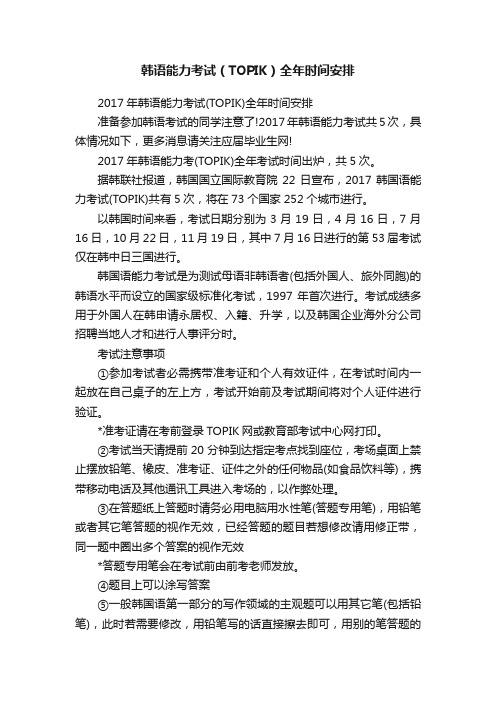
韩语能力考试(TOPIK)全年时间安排2017年韩语能力考试(TOPIK)全年时间安排准备参加韩语考试的同学注意了!2017年韩语能力考试共5次,具体情况如下,更多消息请关注应届毕业生网!2017年韩语能力考(TOPIK)全年考试时间出炉,共5次。
据韩联社报道,韩国国立国际教育院22日宣布,2017韩国语能力考试(TOPIK)共有5次,将在73个国家252个城市进行。
以韩国时间来看,考试日期分别为3月19日,4月16日,7月16日,10月22日,11月19日,其中7月16日进行的第53届考试仅在韩中日三国进行。
韩国语能力考试是为测试母语非韩语者(包括外国人、旅外同胞)的韩语水平而设立的国家级标准化考试,1997年首次进行。
考试成绩多用于外国人在韩申请永居权、入籍、升学,以及韩国企业海外分公司招聘当地人才和进行人事评分时。
考试注意事项①参加考试者必需携带准考证和个人有效证件,在考试时间内一起放在自己桌子的左上方,考试开始前及考试期间将对个人证件进行验证。
*准考证请在考前登录TOPIK网或教育部考试中心网打印。
②考试当天请提前20分钟到达指定考点找到座位,考场桌面上禁止摆放铅笔、橡皮、准考证、证件之外的任何物品(如食品饮料等),携带移动电话及其他通讯工具进入考场的,以作弊处理。
③在答题纸上答题时请务必用电脑用水性笔(答题专用笔),用铅笔或者其它笔答题的视作无效,已经答题的题目若想修改请用修正带,同一题中圈出多个答案的视作无效*答题专用笔会在考试前由前考老师发放。
④题目上可以涂写答案⑤一般韩国语第一部分的写作领域的主观题可以用其它笔(包括铅笔),此时若需要修改,用铅笔写的话直接擦去即可,用别的笔答题的话请对要修改的部分用两行划去,或者用修正带也可。
⑥OMR答题纸上若写错可以重新要求答题纸重写,但考试结束时即使没有答完题也要交卷。
⑦第一部分的写作领域的'主观题的简短答题或者是叙述性答题中,在OMR答题纸前面的栏内写作,后面也可答题⑧考时结束前10分钟可以在监考老师的同意下离开考场,此时不得和其他考生交谈,务必安静地离场、⑨考时结束时请放下笔,答题纸放右边,题目放左边,考试结束后不得再答题。
